#might be the greatest theme from any piece of media ever
Text
What did they put in lauras theme from twin peaks to make me feel so utterly lonley and gut wrenchingly sad in the deepest part of my soul
#its so beautiful and sad at the the same#might be the greatest theme from any piece of media ever#twin peaks#laura palmers theme#laura palmer
18 notes
·
View notes
Text
The Three Commandments
The thing about writing is this: you gotta start in medias res, to hook your readers with action immediately. But readers aren’t invested in people they know nothing about, so start with a framing scene that instead describes the characters and the stakes. But those scenes are boring, so cut straight to the action, after opening with a clever quip, but open in the style of the story, and try not to be too clever in the opener, it looks tacky. One shouldn’t use too many dialogue tags, it’s distracting; but you can use ‘said’ a lot, because ‘said’ is invisible, but don’t use ‘said’ too much because it’s boring and uninformative – make sure to vary your dialogue tags to be as descriptive as possible, except don’t do that because it’s distracting, and instead rely mostly on ‘said’ and only use others when you need them. But don’t use ‘said’ too often; you should avoid dialogue tags as much as you possibly can and indicate speakers through describing their reactions. But don’t do that, it’s distracting.
Having a viewpoint character describe themselves is amateurish, so avoid that. But also be sure to describe your viewpoint character so that the reader can picture them. And include a lot of introspection, so we can see their mindset, but don’t include too much introspection, because it’s boring and takes away from the action and really bogs down the story, but also remember to include plenty of introspection so your character doesn’t feel like a robot. And adverbs are great action descriptors; you should have a lot of them, but don’t use a lot of adverbs; they’re amateurish and bog down the story. And
The reason new writers are bombarded with so much outright contradictory writing advice is that these tips are conditional. It depends on your style, your genre, your audience, your level of skill, and what problems in your writing you’re trying to fix. Which is why, when I’m writing, I tend to focus on what I call my Three Commandments of Writing. These are the overall rules; before accepting any writing advice, I check whether it reinforces one of these rules or not. If not, I ditch it.
1: Thou Shalt Have Something To Say
What’s your book about?
I don’t mean, describe to me the plot. I mean, why should anybody read this? What’s its thesis? What’s its reason for existence, from the reader’s perspective? People write stories for all kinds of reasons, but things like ‘I just wanted to get it out of my head’ are meaningless from a reader perspective. The greatest piece of writing advice I ever received was you putting words on a page does not obligate anybody to read them. So why are the words there? What point are you trying to make?
The purpose of your story can vary wildly. Usually, you’ll be exploring some kind of thesis, especially if you write genre fiction. Curse Words, for example, is an exploration of self-perpetuating power structures and how aiming for short-term stability and safety can cause long-term problems, as well as the responsibilities of an agitator when seeking to do the necessary work of dismantling those power structures. Most of the things in Curse Words eventually fold back into exploring this question. Alternately, you might just have a really cool idea for a society or alien species or something and want to show it off (note: it can be VERY VERY HARD to carry a story on a ‘cool original concept’ by itself. You think your sky society where they fly above the clouds and have no rainfall and have to harvest water from the clouds below is a cool enough idea to carry a story: You’re almost certainly wrong. These cool concept stories work best when they are either very short, or working in conjunction with exploring a theme). You might be writing a mystery series where each story is a standalone mystery and the point is to present a puzzle and solve a fun mystery each book. Maybe you’re just here to make the reader laugh, and will throw in anything you can find that’ll act as framing for better jokes. In some genres, readers know exactly what they want and have gotten it a hundred times before and want that story again but with different character names – maybe you’re writing one of those. (These stories are popular in romance, pulp fantasy, some action genres, and rather a lot of types of fanfiction).
Whatever the main point of your story is, you should know it by the time you finish the first draft, because you simply cannot write the second draft if you don’t know what the point of the story is. (If you write web serials and are publishing the first draft, you’ll need to figure it out a lot faster.)
Once you know what the point of your story is, you can assess all writing decisions through this lens – does this help or hurt the point of my story?
2: Thou Shalt Respect Thy Reader’s Investment
Readers invest a lot in a story. Sometimes it’s money, if they bought your book, but even if your story is free, they invest time, attention, and emotional investment. The vast majority of your job is making that investment worth it. There are two factors to this – lowering the investment, and increasing the payoff. If you can lower your audience’s suspension of disbelief through consistent characterisation, realistic (for your genre – this may deviate from real realism) worldbuilding, and appropriately foreshadowing and forewarning any unexpected rules of your world. You can lower the amount of effort or attention your audience need to put into getting into your story by writing in a clear manner, using an entertaining tone, and relying on cultural touchpoints they understand already instead of pushing them in the deep end into a completely unfamiliar situation. The lower their initial investment, the easier it is to make the payoff worth it.
Two important notes here: one, not all audiences view investment in the same way. Your average reader views time as a major investment, but readers of long fiction (epic fantasies, web serials, et cetera) often view length as part of the payoff. Brandon Sanderson fans don’t grab his latest book and think “Uuuugh, why does it have to be so looong!” Similarly, some people like being thrown in the deep end and having to put a lot of work into figuring out what the fuck is going on with no onboarding. This is one of science fiction’s main tactics for forcibly immersing you in a future world. So the valuation of what counts as too much investment varies drastically between readers.
Two, it’s not always the best idea to minimise the necessary investment at all costs. Generally, engagement with art asks something of us, and that’s part of the appeal. Minimum-effort books do have their appeal and their place, in the same way that idle games or repetitive sitcoms have their appeal and their place, but the memorable stories, the ones that have staying power and provide real value, are the ones that ask something of the reader. If they’re not investing anything, they have no incentive to engage, and you’re just filling in time. This commandment does not exist to tell you to try to ask nothing of your audience – you should be asking something of your audience. It exists to tell you to respect that investment. Know what you’re asking of your audience, and make sure that the ask is less than the payoff.
The other way to respect the investment is of course to focus on a great payoff. Make those characters socially fascinating, make that sacrifice emotionally rending, make the answer to that mystery intellectually fulfilling. If you can make the investment worth it, they’ll enjoy your story. And if you consistently make their investment worth it, you build trust, and they’ll be willing to invest more next time, which means you can ask more of them and give them an even better payoff. Audience trust is a very precious currency and this is how you build it – be worth their time.
But how do you know what your audience does and doesn’t consider an onerous investment? And how do you know what kinds of payoff they’ll find rewarding? Easy – they self-sort. Part of your job is telling your audience what to expect from you as soon as you can, so that if it’s not for them, they’ll leave, and if it is, they’ll invest and appreciate the return. (“Oh but I want as many people reading my story as possible!” No, you don’t. If you want that, you can write paint-by-numbers common denominator mass appeal fic. What you want is the audience who will enjoy your story; everyone else is a waste of time, and is in fact, detrimental to your success, because if they don’t like your story then they’re likely to be bad marketing. You want these people to bounce off and leave before you disappoint them. Don’t try to trick them into staying around.) Your audience should know, very early on, what kind of an experience they’re in for, what the tone will be, the genre and character(s) they’re going to follow, that sort of thing. The first couple of chapters of Time to Orbit: Unknown, for example, are a micro-example of the sorts of mysteries that Aspen will be dealing with for most of the book, as well as a sample of their character voice, the way they approach problems, and enough of their background, world and behaviour for the reader to decide if this sort of story is for them. We also start the story with some mildly graphic medical stuff, enough physics for the reader to determine the ‘hardness’ of the scifi, and about the level of physical risk that Aspen will be putting themselves at for most of the book. This is all important information for a reader to have.
If you are mindful of the investment your readers are making, mindful of the value of the payoff, and honest with them about both from the start so that they can decide whether the story is for them, you can respect their investment and make sure they have a good time.
3: Thou Shalt Not Make Thy World Less Interesting
This one’s really about payoff, but it’s important enough to be its own commandment. It relates primarily to twists, reveals, worldbuilding, and killing off storylines or characters. One mistake that I see new writers make all the time is that they tank the engagement of their story by introducing a cool fun twist that seems so awesome in the moment and then… is a major letdown, because the implications make the world less interesting.
“It was all a dream” twists often fall into this trap. Contrary to popular opinion, I think these twists can be done extremely well. I’ve seen them done extremely well. The vast majority of the time, they’re very bad. They’re bad because they take an interesting world and make it boring. The same is true of poorly thought out, shocking character deaths – when you kill a character, you kill their potential, and if they’re a character worth killing in a high impact way then this is always a huge sacrifice on your part. Is it worth it? Will it make the story more interesting? Similarly, if your bad guy is going to get up and gloat ‘Aha, your quest was all planned by me, I was working in the shadows to get you to acquire the Mystery Object since I could not! You have fallen into my trap! Now give me the Mystery Object!’, is this a more interesting story than if the protagonist’s journey had actually been their own unmanipulated adventure? It makes your bad guy look clever and can be a cool twist, but does it mean that all those times your protagonist escaped the bad guy’s men by the skin of his teeth, he was being allowed to escape? Are they retroactively less interesting now?
Whether these twists work or not will depend on how you’ve constructed the rest of your story. Do they make your world more or less interesting?
If you have the audience’s trust, it’s permissible to make your world temporarily less interesting. You can kill off the cool guy with the awesome plan, or make it so that the Chosen One wasn’t actually the Chosen One, or even have the main character wake up and find out it was all a dream, and let the reader marinate in disappointment for a little while before you pick it up again and turn things around so that actually, that twist does lead to a more interesting story! But you have to pick it up again. Don’t leave them with the version that’s less interesting than the story you tanked for the twist. The general slop of interest must trend upward, and your sacrifices need to all lead into the more interesting world. Otherwise, your readers will be disappointed, and their experience will be tainted.
Whenever I’m looking at a new piece of writing advice, I view it through these three rules. Is this plot still delivering on the book’s purpose, or have I gone off the rails somewhere and just stared writing random stuff? Does making this character ‘more relateable’ help or hinder that goal? Does this argument with the protagonists’ mother tell the reader anything or lead to any useful payoff; is it respectful of their time? Will starting in medias res give the audience an accurate view of the story and help them decide whether to invest? Does this big twist that challenges all the assumptions we’ve made so far imply a world that is more or less interesting than the world previously implied?
Hopefully these can help you, too.
3K notes
·
View notes
Photo
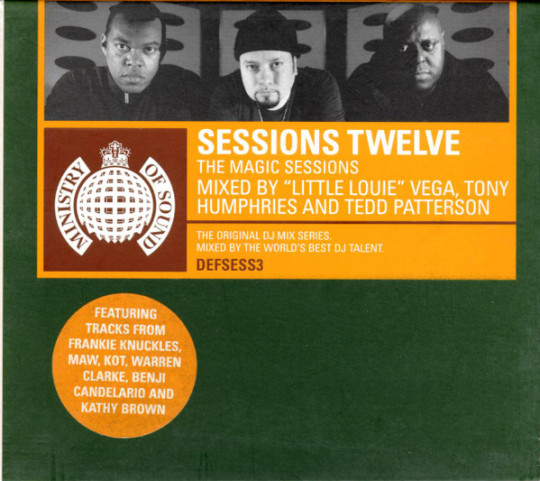

Today’s mix:
Sessions Twelve (The Magic Sessions) by "Little" Louie Vega, Tony Humphries and Tedd Patterson
2001
House / Garage House / Deep House / Tribal House
A little history before getting into this overlooked double-disc triple mix from 2001 that features sets from three of the greatest DJs that house music has ever had the pleasure of bearing witness to...
The time is February 1986 and the place is, strangely enough, a Marriott in Fort Lauderdale. This is where the first annual electronic music convention of any kind, the Winter Music Conference, is set to take place. It's an event in which dance industry insiders, musicians, and DJs can all rub elbows, plan, and build a future for their music and culture.
And of course, alongside the business of dance music at WMC, are also the parties. And after moving the conference to a much more club-hospitable city in nearby Miami, both the WMC and its corresponding parties flourished.
The most important party for a number of years—until the advent of the Ultra Music Festival—was one that started in 1991 called Magic Sessions. And the three DJs whose mixes feature on this release—Louie Vega of Masters at Work, Tony Humphries, and Tedd Patterson—were all fixtures of that annual event, which became a must-attend affair for DJs, because these guys would load up each of their sets with plenty of tracks that had yet to have actually been broken. The way we've come to define the word 'influencer' over the past decade or so wasn't around in those pre-social media days, but these particular parties played a role in shaping dance music history, because previously unheard bangers that got played in those sets would get their official release afterwards and then manifest themselves into their own underground successes. So, DJs of this caliber were some of dance music's biggest influencers at the time, and one of their domains was this event that took place during the Winter Music Conference every year.
Now, coincidentally, there was a DJ mix series that was put out by gargantuan dance labels Ministry of Sound and Defected from the early 90s to early 2000s called Sessions. And even though the first installment was by Tony Humphries himself, and another one from '95 was by Masters at Work, it doesn't appear that this series had anything to do with the similarly named Magic Sessions party. That is, until 2001, with Sessions Twelve, when the series and the event appear to have converged.
None of these three sets, of course, are live recordings, though; a Magic Sessions night was known to have gone on for seven hours or so and this album packs three short mixes onto two separate discs, with Tony Humphries' portion split between both of them (I actually don't think I've ever seen something like that before??). But what it does seem to offer is some of what a specific Magic Sessions event during the WMC at Miami's Crobar club in March of 2001 might have sounded like, because all three of these DJs played there on that very same night. In fact, here's a *very* 2001 flyer for the exact event!


So, this release, all in all, is sublime. It's lined with a whole grip of contemporaneously spectacular garage house tracks—the New York-derived, largely vocally female-fronted, more rooted in the traditions of gospel, soul, and R&B type of stuff that originated at legendary DJ Larry Levan's Paradise Garage in Manhattan. Each DJ on here supplies their own fill of that garage style, and two of them lace it with other sonically different types of house music too. Louie Vega, who, I think, delivers the best mix of the three on here, starts with some Afro-Latin and Caribbean fare, and Tedd Patterson initiates with a blend of some tribal and deep stuff. Tony Humphries, on the other hand, hews to the garage theme pretty closely, but he also kicks off his set with a piece of just straight-up gospel-house.
And while most of these songs appear to have seen their official light of day by now, there's at least one on here that I don't think ever has, and that's DJ Spen's "Unreleased Mix" of Warren Clarke's "Over You," from Tedd Patterson's mix, which dispenses itself of most of its lead vocals from the great Kathy Brown (who gets her chance to shine on Louie Vega's mix), and replaces them with this highly satisfying, perpetually wandering and whining lead synth instead. Basically, what I'm saying is, if ever there were a reason to listen to this particular release, it's that song. And also, the way Frankie Knuckles unleashes this wobbly synth a couple times on the track that precedes it, "Keep On Movin (Dub)," hits *so* much deeper than any version I've run into on YouTube.
A sampling of what it probably sounded like on the night of March 27, 2001 at Miami Beach's Crobar for the highly anticipated annual Magic Sessions party during the Winter Music Conference, with three of the greatest house DJs to ever do it providing miniature sets chock-full of exquisite garage goodies. Just an excellent and underappreciated early 2000s house music time capsule right here. It doesn't get more ephemeral than this one, folks 😊.
Listen to the full album here: CD1 // CD2
Highlights:
CD1:
"Little" Louie Vega mix:
Gypsy Men - "Babarabitiri (Tee's Inhouse Mix)"
Africanism - "Bisou Sauce"
Julien Jabre - "Voo Dance"
KOT feat. Julie McKnight - "Finally (Little Louie Vega Main Mix)"
Urban Magic Presents The Slammin' Boys - "Dreams"
Kathy Brown - "Give It Up"
James Ingram - "Lean On Me (MAW Mix)"
Nathan Haines feat. Verna Francis - "Earth Is the Place (Album Version FK Edit)"
Erro - "Don't Change"
Tony Humphries mix:
Mysterious People - "Fly Away (Jason Jinx Disco Jam)"
4:20 feat. Farid Unique - "Let the Past Rest"
CD2:
Crystal Clear - "Live Your Life"
Photek feat. Robert Owens - "Mine to Give (David Morales Happy Mix)"
Lisa Millett - "Runaway"
The Rooster Presents Funk Deluxe Feat. Mintzy Berry - "Music is Everywhere (Rooster's Bangin' Vox Mix)"
Tedd Patterson mix:
Deep Swing feat. Xavier - "Takin' Me Higher (Bini & Martini Mix)"
Frankie Knuckles feat. Nikki - "Keep On Movin (Dub)"
Warren Clarke feat. Kathy Brown - "Over You (Spen's Unreleased Mix)"
Arnold Jarvis - "Spread Love (Vocal Mix)"
#house#house music#garage house#garage#garage music#deep house#tribal house#tribal#tribal music#dance#dance music#electronic#electronic music#music#2000s#2000s music#2000's#2000's music#00s#00s music#00's#00's music
15 notes
·
View notes
Text
Demon Slayer
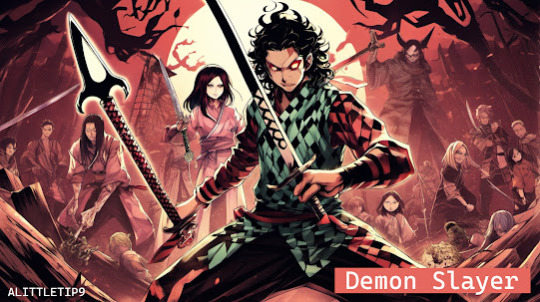
Demon Slayer: Kimetsu no Yaiba (鬼滅の刃, Kimetsu no Yaiba, "Cutting edge of Devil Destruction") is a Japanese manga series composed and delineated by Koyoharu Gotouge. It was serialized in Shueisha's shōnen manga magazine Week after Week Shōnen Hop from February 2016 to May 2020, with its parts gathered in 23 tankōbon volumes. It has been distributed in English by Viz Media and at the same time by Shueisha on their Manga In addition to stage. It follows high school Tanjiro Kamado, who endeavors to turn into a Demon Slayer after his family is butchered and his more youthful sister, Nezuko, is transformed into a devil.
A 26-episode anime TV series variation created by Ufotable circulated from April to September 2019. A spin-off film, Demon Slayer: Kimetsu no Yaiba - The Film: Mugen Train, was delivered in October 2020 and turned into the most elevated-earning anime film and Japanese film ever. An 18-episode second time of the anime series circulated from October 2021 to February 2022 while a gathering film, Demon Slayer: Kimetsu no Yaiba - To the Swordsmith Town, was delivered in February 2023. An 11-episode third season circulated from April to June 2023. A fourth season has likewise been declared.
By February 2021, the manga had north of 150 million duplicates available, including advanced renditions, making it the 10th smash hit manga series ever. Likewise, it was the top-of-the-line manga in 2019 and 2020. Both the manga and its anime transformation have gotten basic recognition. The anime series has gotten various honors and is viewed as one of the most amazing anime of the 2010s. In 2020, the Demon Slayer: Kimetsu no Yaiba establishment created an expected yearly deals income of ¥1 trillion ($8.75 billion), becoming one of the greatest netting media establishments ever.
Creation
After Gotouge's manga, Haeniwa no Crisscross, distributed Week after week by Shōnen Hop in 2015, neglected to turn into a serialized work, Tatsuhiko Katayama, Gotouge's most memorable manager, recommended Gotouge to begin a series with a "straightforward theme". Gotouge's presentation work Kagarigari would turn into the reason for an underlying draft, named Kisatsu no Nagare (鬼殺の流れ) since it had ideas like blades and devils, which would be recognizable to the Japanese audience. Be that as it may, because of its serious tone, absence of entertainment, and dim story, this draft was not acknowledged for serialization. So, Katayama requested that Gotouge take a stab at composing a more brilliant, more ordinary person in the equivalent setting. The first title was Kisatsu no Yaiba (鬼殺の刃), yet they felt the person "satsu" (殺, lit. "kill") in the title was excessively plain.
Even though it is a made-up word, "Himitsu" (鬼滅) appeared straightforward, so Gotouge figured it would be intriguing to shorten the series' title like that; "Saiba" (刃, lit. "edge") suggests a Japanese sword. As per Gotouge, the series' three greatest impacts are JoJo's Odd Experience, Naruto, and Bleach. Tatsuhiko Katayama, a manager of the Demon Slayer: Kimetsu no Yaiba manga, has said in interviews that the red-haired, scar-confronted Tanjiro was motivated by Rurouni Kenshin, a 1990s manga about a likewise drawn fighter, Himura Kenshin.
All satisfied materials on this [https://www.alittletip9.com] are safeguarded by intellectual property regulation and are the proprietor's property. No piece of this [https://www.alittletip9.com] might be replicated, dispersed, or sent in any structure or using any means, including copying, recording, or other electronic or mechanical strategies, without the earlier composed consent of the proprietor, except brief citations encapsulated in basic audits and certain other noncommercial purposes allowed by intellectual property regulation.
0 notes
Note
Okay! This is all from memory so forgive me if I've forgotten something.
Starting with Roy: while I still maintain that he's a himbo, I think he's more complicated than I initially gave him credit for. When I sent the previous essay I was fully expecting him to go from this morally gray Dirty Harry style government figure to the white knight hero who saves the day and becomes a saint, but he maintained his moral ambiguity, which i REALLY appreciate in a character. A common theme throughout the show is being haunted by your past, and Roy is no exception, while he might have justified his actions at the time with the guise of doing his duty and patriotism he always knew what he did was wrong, and this ate away at him more and more as time went on. And to find out the atrocities you committed were not justified, but in fact utterly evil? Devastating. That's why I think the confrontation with Envy is so powerful, not only did Envy start the war, but they also killed Roy's best friend, and this truly set Roy off the rails. Perhaps he thought that by destroying Envy he could somehow vindicate himself. But that's not true, if Roy lost himself down in the tunnels he would only have spiraled downwards out of control, and it took a guiding hand to bring him back from the edge.
Speaking of, Riza! When I first spoke of her I Thought she was just a cool lady with guns, now I see that she's more than just a cool lady with guns, she's another example of a broken individual just trying to do the right thing. I think she's had a hard life, I can't imagine growing up with an alchemist father was easy, especially when his subject of choice was so dangerous, but then to have said dangerous work permanently marked on her own skin and told to keep it secret is tragic. It must have taken so long to precisely tattoo on her, and longer yet for Roy to study it. She must've trusted him enough to allow him to study it, so I imagine her thinking "did I make a big mistake?" upon seeing Roy use flame alchemy during the war. Speaking of the war, Riza appeared to be very young when she was involved, which is also tragic. It's like she had her youth and Innocence ripped away by forces she couldn't control. And while Roy might have had a higher body count, Riza was a sniper which meant she had a more...intimate relationship with the atrocities she committed. This is reflected in the scene where she buried a person she killed and asked Roy to disfigure her back to rid the world of her father's burden. She felt it was her mistake. Another very powerful, defining scene. Her father's work, the war, that moment, all stuck with her for the years after. Changed her. She clearly became very close with Roy during the war and they decided that they had to stick by one another.
To touch on their relationship very briefly, I honestly don't have the words to describe how just PERFECT their relationship is tbh. Like, their relationship inspired me to alter how I portray the relationship between two of my own characters, so that should tell you how much I like them. The dynamic is just great!
anon i love you, but you understand that himbos are like.. dumb and nice, right? roy is pretty much a genius and like.. he's not very nice, despite being a good person. i concede that, at times, he absolutely radiates himbo energy, but he is NOT a himbo. i will throw hands with you on this hill.
also, yes i completely agree that i prefer he was not relegated to a boring white knight. he is much more interesting as a man seeking redemption than a man absolved of his past. the confrontation with envy is easily the most impactful moment of any piece of media i've ever engaged with, personally. the life-and-death stakes of that moment were so unconventional compared to life-and-death in other stories. in most stories, the danger of death is coming from the opponent the hero is fighting. you're on the edge of your seat because you don't know if your protag is going to dodge the attacks, find the opening to strike, and be able to finish the job.
but roy has already won. he has overpowered envy with very little effort and reduced him to his weakest and most helpless state. the danger is not from his opponent here. in this moment, the greatest threat to roy's life is his own hatred. we don't want him to finish the job; it would mean his own undoing if he did. we ache for the pain that he is in, but we also know deep down that riza is right, that what he is about to do will bring him to a place where nobody, not even she, can reach him. and it hurts so badly, because what brought roy to such unbelievable hatred is the unmitigated intensity of his love. because we all love. and to see such love turn into such hate is to see a crossroads in our own souls, the choice between hatred and grief. i am certain that choosing grief is the more difficult path, and i cannot imagine the state of his heart and soul in that moment.
as for riza.. god.. she fucking kills me, man. it's not in the anime, but in the manga when she tells edward about ishval, she tells him that she was brought to the front lines when she was in her final year of the academy. so she was about 20, maybe 21, when she was taking part in a genocide. as a cadet. the unfortunate thing about it is that she didn't actually have her innocence quite ripped away without her control, not as she sees it at least. she maintains that she made the decision on her own to join the military, and she knew she would have to kill people. she says she has no right to see it as a burden. i think this is partially because of her own body count, but also because she feels responsible for every single ishvalan who died at roy's hand. i cannot imagine her feelings when she first sees roy there. in the manga, she actually saves him and hughes from an ishvalan assailant, and then hughes brings roy to meet his savior, and that's how they reunite. it is not clear whether riza was aware of roy's presence on the front lines via rumors, or if that moment where she rescued him was the first time she knew of his being there. either way, it's fucking tragic to realize that the boy you trusted because he told you of his naïve dreams for the future turned out to be using the powers you've given him to kill thousands of innocent people. even after she speaks with him, finds out he feels the same way she does about the war.. i simply cannot fathom the war inside of her over how she feels about him throughout the war. i have to wonder if him agreeing to burn her tattoo off was what convinced her that she could still trust him. and then she goes on to stay in the military, at his side, in spite of everything she went through and knowing there will be more to come. she bears this guilt by his side; even though she could have walked away, she would not have found rest in a civilian life, not after everything she did, the things she facilitated. she tells roy, in the manga when she reports to his office after graduating from the academy, that she likes guns because she doesn't have to feel her victims die. roy tells her this is nothing more than self deception, and she tells him she knows, and that she will continue to deceive herself for his sake, so that he can reach his goals.
and their relationship....god. i could cry. i have never loved a fictional relationship with anywhere even approaching the intensity of my love for royai. it's just so... fucking good ksjdfhgjksdhfksud like... god. the tenderness, the trust.. the fact that they literally have already been through hell and would go there again for one another willingly. the absolute dedication. the fact that they know each other so well, when riza hesitates for only a fraction of a moment, roy knows immediately that something is terribly wrong. all the little looks they give each other. god. just. GOD. damn it. i love their love so much.
#Anonymous#long post#fmab#fma talk#royai#roy mustang#riza hawkeye#otp: even into hell#sorry for longposting back at you but you Activated me... so...
18 notes
·
View notes
Photo
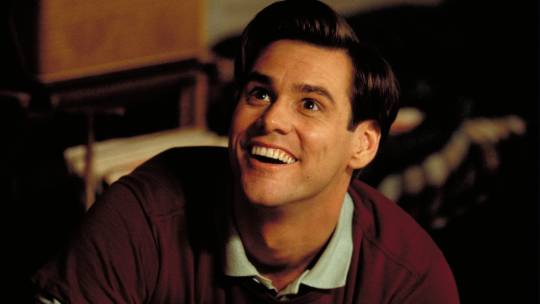
In Focus: The Truman Show.
Inspired by Letterboxd data that revealed it to be a lockdown favorite, editor-at-large Dominic Corry looks at the ever-evolving importance of contemporary masterpiece The Truman Show.
It has long been apparent that The Truman Show is an unnervingly prescient film. The story of a man who becomes aware that his superficially idyllic life is, in fact, a live-streamed television show has gone from being high-concept to every-day.
Thanks to the three Ps—the prevalence of mass urban surveillance, the proliferation of reality television and the pervasiveness of video in social media—the notion of cameras filming our every move is no longer a paranoid fantasy, but real life. The twist being that, for the most part, we all willingly signed up for it, and did all the filming ourselves. As Yi Jian saliently observes in his review: “Not to get all ‘we live in a society’ on Letterboxd but I know a person or two in real life that would actually give anything to trade lives with Truman, it do be like that sometimes”. It indeed do, Yi Jian.
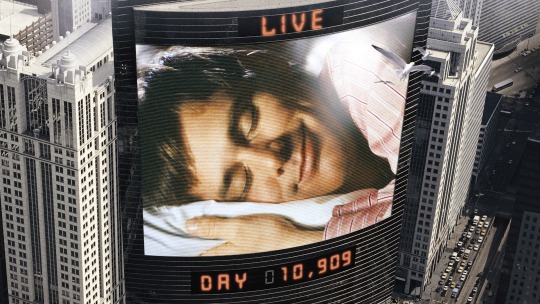
So it’s something of a cliché at this stage to point out how we are all living in some version of the The Truman Show, and you don’t have to be a member of the royal family to feel that way. Yet, somehow, the film has become even more pertinent over the last eighteen months. And it’s a pertinence reflected in the massive uptick in viewership for the film as seen in Letterboxd activity.
During the month of February 2020, the last moment of the Before Times, The Truman Show had a modest 1,235 diary entries. That number tripled in April of that year, by which time the seriousness of the pandemic had become clear. And by July, deep in the worst of the pandemic, Truman fervor peaked, with a further 178 percent leap over April’s numbers, firmly placing it in the top 200 films watched by our members in a year of lockdown. (By the way, ‘diary entries’ mean activity where the member has added a watched date; many thousands more also marked Truman as ‘watched’ in those dark months, but didn’t specify a date.)
It’s not difficult to imagine why we might become more interested in revisiting this eminently re-visitable film. During lockdown, social media—including Letterboxd—took on a greater presence in terms of how we communicated with each other. We got used to seeing footage of faces more than actual faces. We were all the stars of our own ‘Truman Show’, and simultaneously the audience of everyone else’s ‘Truman Show’.
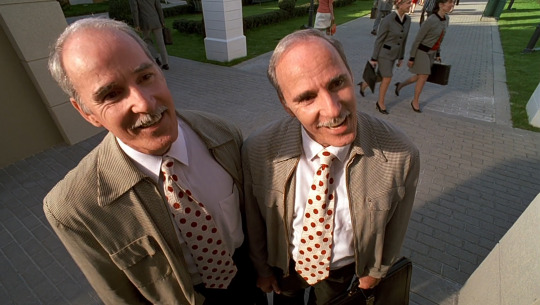
Christian Torres boiled it down effectively when he wrote: “Now every movie I see seems to be related to my life in quarantine. I am Truman and I want to escape.” And Sonya Sandra eloquently captured the film’s increased contemporary significance in her review: “This is a real-life daylight horror film. The best kind. Even more relevant in 2021 than ever. We are all Truman, we all want to find what is real in our fake lives filled with media, capitalism and ideology. And it’s our job to fight the storm and get to the truth of it all. Nothing is real, everything is for profit, and everyone is selfish. Go out and find what is real, because it’s definitely not here.”
With its deft, dazzling blending of the profound and the humorous, the optimistic and the cynical, it’s difficult to think of anything released since The Truman Show that comes as close as it does to being a modern-day Frank Capra movie. It’s hopeful, but has its eyes wide open. There’s a darkness in the themes of the film that is never replicated in the colors on display.
While everyone involved delivers career-best work, we must principally credit the triumvirate of talent at the center of the film: director Peter Weir, screenwriter Andrew Niccol and star Jim Carrey.
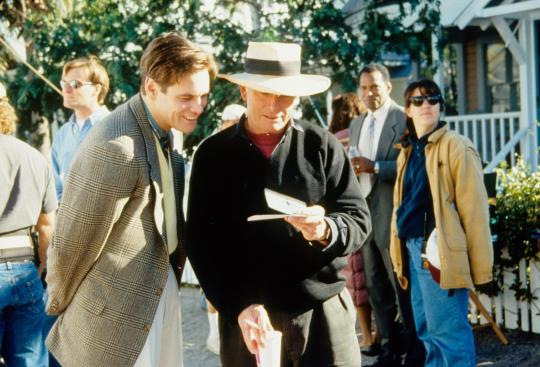
Star Jim Carrey and director Peter Weir on the set of ‘The Truman Show’ (1998).
Weir is a director who inspires much online love whenever his name is mentioned, but he isn’t really mentioned all that often. Or at least as often as he should be. The Australian filmmaker has delivered masterpieces across multiple genres, and it’s extremely sad that he hasn’t directed a movie since 2010’s not-quite-true World War II drama The Way Back, arguably one of his lesser works. That’s also, insanely, one of only two movies he’s made since Truman, the other being Master and Commander: The Far Side of the World, the wide and rabid affection for which regularly kicks up on Twitter (not to mention demand for a sequel).
Weir doesn’t do many interviews, and while this 2018 Vanity Fair article marking Truman’s twentieth anniversary has many quotes about the film’s modern relevance, Weir doesn’t offer any commentary to that effect, presumably preferring to let the work speak for itself—though in this 1998 interview he did talk about the relationship between the media, the general public and the people we become fascinated with, as a “complex situation”.
The Vanity Fair article does, however, reveal a fascinating ‘what if’ scenario relating to Christof, the god-like director of the in-movie TV show played by Ed Harris, who offers up a pile of pretentious auteur clichés: mononymous, beret, etc. (beyond the whole god thing, that is). When Dennis Hopper, originally cast in the role, wasn’t working out, Weir considered playing the role himself, which would’ve added yet another meta layer. It brings to mind how George Miller styled Immortan Joe (played by Hugh Keays-Byrne) after himself in Mad Max: Fury Road, or how Christopher Nolan’s haircut shows up in most of his films.

Ed Harris as Christof in ‘The Truman Show’ (1998).
And, at one point, it could have gone mega-meta. Weir, in the 1998 interview, talked about a “crazy idea” he had, a technical impossibility back then but easily achievable with live-streaming now. “I would have loved to have had a video camera installed in every theater the film was to be seen [in]. At one point, the projectionist would … cut to the viewers in the cinema and then back to the movie. But I thought it was best to leave that idea untested.” Imagine.
Weir also played a role in helping to shape the originally much more overtly dark screenplay into the cheerier (on the surface at least) shooting script, which is solely credited to fellow antipodean, New Zealand-born Niccol, also a producer on the film. Both men have done the majority of their work in America, but it’s tempting to credit the film’s tone-perfect sense of heightened Americana to the degree of separation offered by their foreign provenance. In any case, it’s clear that open-air mall designers were paying attention.
Niccol’s original screenplay made his name in Hollywood, and revealed a storyteller excited by big ideas. He moved into directing with the smaller-scale Gattaca, released a year prior to Truman (itself delayed to meet Carrey’s availability). Niccol’s subsequent filmography includes several legit bangers (Lord of War hive step up!), and his endearing dedication to lofty allegories in a genre setting makes him an increasingly rare breed in Hollywood.
Like Weir, he is not the greatest fan of giving interviews, but the Vanity Fair piece quotes him making an interesting point: “When you know there is a camera, there is no reality,” thereby making Truman “the only genuine reality star.”
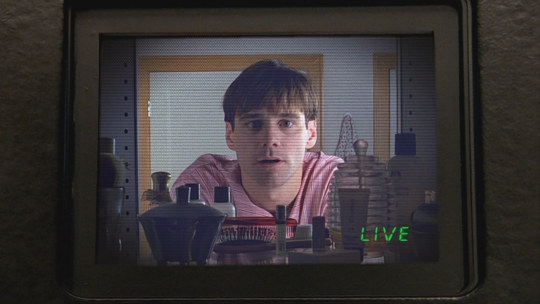
It’s a sentiment echoed by MusicMoviesMe, who writes that “‘Truman Show’ beats all other reality shows out there like Bachelors, Survivors and Kardashians. Come on, when you know there’s a camera at your tail, there’s no reality. So yes, Truman beats all reality shows out there bar none!”
The role was perfectly suited to Jim Carrey’s affected mannerisms, and his status as one of the world’s biggest stars meant he could relate to Truman more than most people. Then, at least. Nowadays, of course, we are all Truman.
“It is always incredible to see how far The Truman Show was ahead of [its] time,” observes The Closer79. “In a world where celebs are monitored 24/7 and we are showered with unnecessary private information on the web, where talent-free wannabes become famous and where you sometimes [wonder] what kind of surreal show society you are in—Truman and his fake show life cleverly have anticipated all of this. Only Truman knew nothing of his luck and he was granted an escape from his glass prison. We don’t really have this possibility… Aren’t we all Truman? Sometimes even voluntarily…”
Austin Burke concurs: “I have always known that I really enjoyed this film, but I had no clue that it would hold up so well years later… Could this be because the strange world that he finds himself in is far more similar to our world today? Possibly, but the idea and themes are so much more relevant now compared to when this originally released.” And while DallasFrance is conscious of piling on about the film’s prescience, his review highlights how there really is no limit to the film’s meta qualities:
“Instead of writing a review about how this film predicted social media, or how we’re all Truman, or yadda yadda yadda, I’ll instead fixate on the miraculous fact that two absolute legends were cast as primary viewers of the Truman Show:
1. The old lady from The Running Man who starts betting on Ben Richards (Arnold Schwarzenegger). ‘He’s one bad motherf*cker!’
2. The villain from The Karate Kid Part II:
‘Live or die, man?!’
‘Die!’
‘Wrong!’ *hooooonnnkkk*
I’ve never seen either of these actors in any other roles. With the second one, I felt like I was watching a character from my childhood watch a character from his childhood come to realizations about the characters in his childhood. So actually… the movie’s really about me.”
Never change, LB membership.
We are all generally pretty aware of how ahead of its time The Truman Show was, but that doesn’t lessen its impact. Maddie’s review shows that there’s always some new angle to consider: “Imagine being an extra in this movie… You would be an extra, playing an actor, playing an extra. Think about that long enough and tell me that doesn’t make you want to walk into the ocean.”
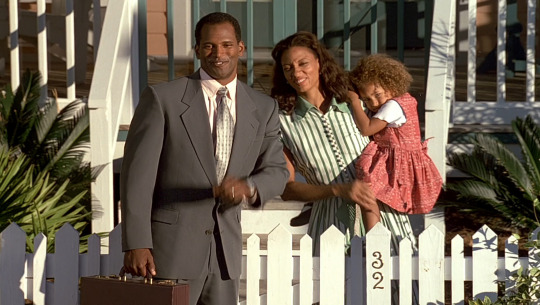
Kev goes even further: “Watching other people watch somebody else while also watching that person while also watching the person watching over that person is a great reminder that watching is weird, and to be watched is to not own yourself. Don’t watch, don’t try to be watched. Just live.”
Or perhaps Will encapsulates the film’s ability to present an ever-evolving message best, writing that, “clearly, this is video proof that we live in a simulation.” Beyond mere prescience, The Truman Show is a telling mirror to whatever era it is viewed in. Its message will continue to evolve.
Now that we’re finally (touch wood) emerging from the pandemic, it will be fascinating to see what The Truman Show has to say about its audience and the world they live in, in years to come. Rest assured, it will be well-documented by you, the Letterboxd audience.
Also: can Peter Weir please make another movie? Like, seriously.
Related content
A Meta-Reality: Robert’s list of layers of film in life and life in film
Follow Dom on Letterboxd
#the truman show#truman#peter weir#jim carrey#andrew niccol#letterboxd#lockdown#quarantine#coronavirus#pandemic#movies#comfort films#comedy#truman show
40 notes
·
View notes
Text
Aghh! touhou. My feelings on it as of this day (and every day forever, i’m sure):
so when it comes to the ‘official’ works themselves, i’ve always been a fan. All the famous and iconic things like the music, the art, the bullet patterns, random new setting and personality insights revealed through manga or weird side-books. Don’t think i’ll ever get tired of it.
But by far the biggest impact that touhou has had on me is simply because of like... its identity and place in doujin culture, i think? A lot of my (and im sure this goes for most fans too) greatest and fond memories relating to this series comes from the fans and the derivative works. The fanart, the fanfiction, comics, music arranges and so on so forth. I’ve used this comparison before, but touhou series is like... a dollhouse? And a big appeal of getting new ‘dolls’ is seeing what fun you can have playing with them for your own stories, or getting glimpses into how they can play off the older dolls.
i waned off touhou for a little while, but now that i think about it, i know exactly the reason why i fell so hard back into it. Its because i realised the most important thing in consuming media to me is wanting to see what kind of idea or theme the creator(s) might have had and seeing it come to fruit for an audience. Because i think making things is like, such an important (maybe -the- most important?) thing for strangers to do to connect to one another!
But like... Getting too attached to a piece of media is always a risky thing to do, you know. Even if it’s something that really affects you, you have to step back and remember its nature as a product (or advert or propaganda or whatever else it might be).
Thus, i’m sure the big reason why i’m so drawn towards ‘fan’ work or derivative work as a whole, whether its drawings or music or writing, is that I always know at the back of my mind that it was a creative someone idea had that they have now shaped for others to see.
and when it’s touhou in particular, I can’t help but want to imagine, even when there’s a language barrier, that me and this other person who has created a thing were inspired by the similar things, and in turn are inspired by others doing the same.*
...But like, it’s all still just another media at the end of the day. No matter how much a certain (or many certain...) works may wrench me to the very soul, i don’t want to just define my very being and existence by this japanese shooter game! I’ve come close to doing just that a few times in the past, before realising just how miserable and pathetic that is. There’s no telling when any of these ultimately material things will just disappear, after all, and I don’t want to be wishing for touhou itself to become my ‘perfect’ thing my whole life. (Although if we could get some more non-evil chinese characters who aren’t meiling, and some more canon dark-skinned characters, it’ll be pretty close!)
so i guess in sum, i love touhou but i might be constantly afraid of investing too much of myself into it as a whole... ‘Stepping away from it’ i know isn’t something that’ll help nor something i want to do, so instead i’m determined to find other things in life i can be just as passionate about (and i don’t just mean other media!)... or at least, ‘decently’ passionate about.
7 notes
·
View notes
Photo

Batman: Mask of the Phantasm (1993)
In American animation outside of Disney, no other studio inspires as much reverence as Warner Bros. The Merrie Melodies and Looney Tunes shorts precipitated into worldwide recognition for those series’ stock characters. Despite this success, Warner Bros. did not release an animated feature until the musical Gay Purr-ee (1962), in association with United Productions of America (UPA). Animators at Warner Bros. from the 1930-1960s knew they were not making high art, nor were they pretending to. Warners, since the 1930s arguably the most financially stable of the major Hollywood studios, has historically seen little need to bankroll animated features. With that in mind, it might come as less of a shock that Warner Bros.’ first in-house animated feature is Eric Radomski and Bruce Timm’s Batman: Mask of the Phantasm. Originally intended as a direct-to-home media release, Mask of the Phantasm – based on and made by the production team behind Batman: The Animated Series (1992-1995) – transcends those modest intentions. It is among of the best superhero films ever made.
In the wake of Tim Burton’s Batman (1989) and Batman Returns (1992), Batman: The Animated Series, unlike Burton’s efforts, affords time to characterize Bruce Wayne rather than surrendering ample screentime to thinly-written but scene-stealing villains. For that and many other reasons including the looming, vertical art deco-inspired production design of Gotham City; the distinctive and moodiness of its black paper backgrounds; and its balance of dark and lighter tones, BTAS remains a high-water mark among Batman fans – perhaps the best adaptation of the character there is. Mask of the Phantasm builds upon that foundation, in addition to crafting its own unique contribution within the DC Animated Universe (DCAU). As tired as origin stories are, Mask of the Phantasm is part-origin story for the Dark Knight – something largely avoided in BTAS – and somehow integrated here without distracting from the present-day scenes. Rarely is any Batman media a character study of Bruce Wayne, but Mask of the Phantasm proves itself a wonderful exception.
One evening, Batman/Bruce Wayne (Kevin Conroy) attempts to stop a gaggle of gangsters led by Chuckie Sol (Dick Miller) from laundering counterfeit money from a casino. Amid the scrum, Sol escapes from Batman, but immediately confronts a shadowy figure later known as the “Phantasm” in the parking garage – Sol dies in the confrontation. Batman receives the blame for the killing and the concurrent property destruction from Gotham City Councilman Arthur Reeves (Hart Bochner), who just so happened to be profiting from Sol’s racket. Across the film, Bruce reminisces about his courtship with Andrea Beaumont (Dana Delany), their breakup, and the lead-up to the creation of his Batman alter-ego. Juxtaposing Bruce’s past and present, we see how he channels his regrets and profound loss into being Batman. The past haunts him still, overhanging the high roofs of Wayne Manor and the ledges of Gotham’s skyscrapers. Back in the present day, the Phantasm has murdered another crime boss; a third murder involves the Joker (Mark Hamill), initiating an emotional dénouement that, because of the intricacies of motivation that the film develops, elevates the film beyond what might otherwise be sloppy storytelling.
The dramatis personae also includes crime boss Salvatore “The Wheezer” Valestra (Abe Vigoda); Andrea’s father, Carl Beaumont (Stacy Keach); the Wayne family butler, Alfred Pennyworth (Efrem Zimbalist Jr.); GCPD Commissioner James Gordon (Bob Hastings); and GCPD Det. Harvey Bullock (Robert Costanzo).
The screenplay by Alan Burnett (producer and writer on various DC Comics films and Hanna-Barbera productions), Paul Dini (head writer on BTAS and Superman: The Animated Series), Martin Pasko (a longtime DC Comics writer), and Michael Reaves (head writer on BTAS and 1994-1996’s Gargoyles) keep the film’s attention on Batman/Bruce Wayne, despite the introduction of various subplots and Joker – whose somewhat-questionable presence might seem to indicate a project going off the rails. Shadow of the Phantasm’s placement of flashbacks stems the awkwardness that Joker’s inclusion brings, assuring that the film stays grounded into Batman’s psychology. In past Bruce we see a charming young man with time, money, and looks to spare. His romantic side with Andrea is an element of his life, one that connects – inevitably, tangentially – to the trauma his parents’ murder. His most personal motivations – that which a younger Andrea could never see, and privy to only Alfred – are stuck in the past, circulating around that childhood loss.
The occasional reflections from Bruce Wayne on what his life has become make Mask of the Phantasm the most introspective piece within the BTAS continuity, freed from the constraints and expectations inherent of episodic television. No BTAS episode forces its eponymous character to confront himself to such extents. What Bruce Wayne and Batman have become in the present-day treads perilously close not to his style of vigilante corrective justice, but vengeance. The tragic paradox that lies at the heart of this tension is the soul of the Batman mythos. Anyone with the most basic understanding of who Bruce Wayne/Batman and the Joker are will at least have a glimmer of understanding of that paradox. This portrait of what Batman stands for is more maturely handled than any of the twentieth century live-action Batman films, and with less sensational filmmaking than Christopher Nolan and Zack Snyder could produce. But with the film’s screenplay and Kevin Conroy’s iconic voice acting as the Caped Crusader, it becomes an inquest into Bruce Wayne’s tortured soul.
If Mask of the Phantasm ran longer than its seventy-eight-minute runtime, Andrea Beaumont, too, might also have received similar character development as Bruce Wayne here. Even within those seventy-eight minutes, Andrea – with a great assist from Dana Delany’s voice acting (Delany so impressed Bruce Timm here that she was given the role of Lois Lane in Superman: The Animated Series) – is a nevertheless fascinating character. In a cruel irony, her ultimate role in Mask of the Phantasm is to be an incidental mirror to the violence that occurs in this film. Her decision is not an imposition, whether conscious or unconscious, from someone else, but hers and hers alone.
In this drama fit for opera, this Batman occupies a world of operatic proportions. The background and character animation are not as pristine as the best examples of BTAS due to some scattered bits of animation outsourcing. The animation of BTAS might seem stiff and janky to modern viewers expecting Flash hand-drawn animation or hand-drawn/CGI hybrids. However, Mask of the Phantasm retains the gravity-defying art deco of the animated series that somehow does not clash with the ‘90s-influenced and futuristic elements it integrates. Its primary inspirations are of film noir and the Metropolis seen in the Fleischer Studios’ Superman series of short films (1941-1943). The black paper backgrounds provide Gotham’s street corners and rooftops a nocturnal menace, immersing the viewer into the city’s seediness.
Composer Shirley Walker (orchestrator on 1979’s The Black Stallion, conductor and orchestrator on 1989’s Batman) was one of the few women composers in Hollywood at the turn of the twentieth into the twenty-first century. A pianist (she played with the San Francisco Symphony as a soloist while still in high school) who studied music composition at San Francisco State University, Walker would later become one of the first female film score composers to receive a solo credit for composing the music in John Carpenter’s Memoirs of an Invisible Man (1992). But it is her work in the DCAU that distinguishes her – of particular note is her arrangement of Danny Elfman’s theme to 1989’s Batman for BTAS and a wholly original main theme for Superman: The Animated Series. Though Walker could adjust her style to suit a more synthetic sound, she specialized in composing grand orchestral cues. That style was apparent in BTAS and is adapted here from the opening titles (the lyrics here are actually gibberish and are the names of Walker’s music department sung backwards). The foreboding brass and string unison lines seem to reverberate off the animation’s skyscraper-filled backgrounds. Numerous passages in Walker’s score, as if taking hints from Richard Wagner, elect not to resolve to the tonic – setting up scenes where tension escalates alongside the music, forestalling the dramatic and musical release.
youtube
One stunning exception to Walker’s ominous, atmospheric score is the gentle cue “First Love”, an interplay between solo oboe and synthesizer. Bruce’s flashbacks are not only a balm to the grimness of his present situation, but a musical reprieve from the intensity of the action scoring. That Walker can navigate between such differing moods exemplifies her compositional dexterity and overall musical excellence. Walker, who cited Mask of the Phantasm as her personal favorite composition for any film or television production, was one of the DCAU’s greatest under-heralded contributors. And how I wish she was given more chances to score different sorts of films.
Warner Bros.’ last-minute reversal on Mask of the Phantasm’s release strategy – abandoning the direct-to-home media debut for a theatrical release – meant minimal marketing for a low-budget film that made barely a dent at the box office. The film’s home media release would more than make up for the film’s theatrical release failure. Upon the success of BTAS and the critical acclaim lavished on Mask of the Phantasm, Warner Bros. kept the DCAU on television for another thirteen years, with infrequent direct-to-home media movie releases as recent as 2019.
For numerous DC Comics fans, the DCAU is an aesthetic and narrative touchstone. The limited animation is sublime for this period in animation history. In addition, one will overhear fans remaking that a certain superhero’s definitive portrayal might be thanks to the DCAU. The superhero benefitting the most from the DCAU’s characterization and storytelling is unquestionably Batman. And justifiably so, as Mask of the Phantasm shows due respect for Batman and Bruce Wayne – what molded them and how each persona intertwines with the other. The mythos behind any superhero is found not in fight scenes. Instead, it resides in the psychology and rationalizations that forces a person to directly confront another’s wickedness. Mask of the Phantasm realizes that such confrontations test Batman/Bruce Wayne’s remaining vestiges of humanity, and braves to ask moral questions that too many figures of superhero media would rather not think about.
My rating: 8.5/10
^ Based on my personal imdb rating. My interpretation of that ratings system can be found in the “Ratings system” page on my blog (as of July 1, 2020, tumblr is not permitting certain posts with links to appear on tag pages, so I cannot provide the URL).
For more of my reviews tagged “My Movie Odyssey”, check out the tag of the same name on my blog.
#Batman#Batman: Mask of the Phantasm#Bruce Timm#Eric Radomski#DCAU#Kevin Conroy#Dana Delany#Hart Bochner#Stacy Keach#Abe Vigoda#Dick Miller#Efrem Zimbalist Jr.#Bob Hastings#Robert Costanzo#Mark Hamill#Shirley Walker#Glen Murakami#My Movie Odyssey
16 notes
·
View notes
Text
OPINION: How Umineko Changed My Entire Approach to Fictional Media

All screenshots captured on Playstation 3 by author
The following article contains a discussion of thematic elements and motives that appear during the second half of Umineko When They Cry. While no actual plot details will be revealed, some might still consider it spoilery. So if you want to experience one of the greatest pieces of fiction ever completely untainted, you should check it out on Steam right now.
The internet is pretty rad, isn't it? You can follow your favorite creators, watch tons of awesome shows, and talk about your favorite things with other people. How about we do that right now? Well, too bad, because YOUR FAVORITE THING IS BAD, ACTUALLY! You made the mistake of posting about it online, so prepare to be sent lots of negative comments linking to 5-hour video essays pointing out every single flaw about your favorite story and why you are wrong for enjoying it!
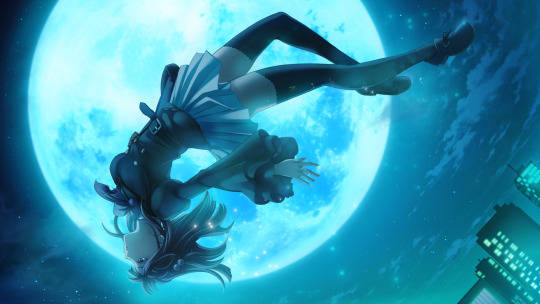
It's a situation I'm sure many of us have experienced at least a couple of times online. While the internet can be fantastic for finding like-minded people to chat with about things you deeply love, it can also be a gamble and sometimes you end up in a discussion where your conversational partner seems more interested in showing off their intellectual superiority over a work instead of openly discussing its merits or flaws. I certainly know — I used to be one of them.
"As I've eaten my way through countless tales to escape boredom, I haven't really been eating them. I've just been killing them." - Hachijo Tohya
The rise of social media has opened the gates for some incredible in-depth discussion and has changed the way I experience things over the years. But there is also a dark side to the discussions on the internet and that is the trap of wanting to feel intelligent in how you approach stories, which is often accompanied by not really being emotionally earnest. I myself tried to come off as perceptive by pointing out so many mistakes and bad things about media which led to exactly one thing: me becoming absolutely miserable. All I cared about was consuming as many things as possible (FOMO's also one of the many downsides of social media) and appearing as "smart" about them as I could. Until one fateful 10-month stretch in which I played a certain visual novel known as Umineko When They Cry.

Umineko really is tailor-made for catching people with that mindset: It depicts a mystery story about how mystery stories are told and consumed — and what genre would be more fitting to challenge someone concerned with intellectual superiority than one that is all about the clash of Author vs Reader?
"Books aren't a competition. It's not about who's read the most. But boasting that you've read all your ever need to read is just as wrong-headed" - Battler Ushiromiya
Umineko starts off with a well-known mystery trope: A family meets up in a mansion on a distant island, gets cut off by a storm, and then slowly gets murdered one after the other until everyone is dead. And just as in Agatha Christie's And Then There Were None (which served as one of Umineko's main inspirations), a bottle detailing the events of the incident to the public eventually washes ashore. But this only serves as Umineko's prologue, as its main character Battler quickly finds himself facing off against a self-proclaimed Golden Witch known as Beatrice on a meta-narrative level where he must prove these gruesome killings could have been committed by a human culprit, or be forced to acknowledge her existence and allow her to fully revive.
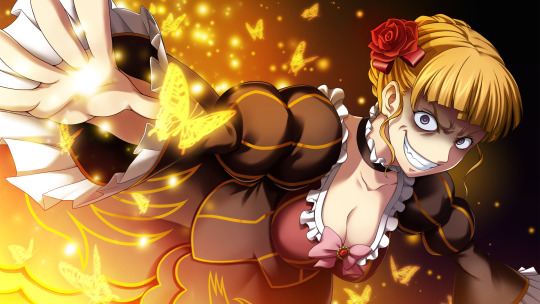
Thus begins a game of chess filled with exceedingly preposterous murders in which our protagonist's family gets killed by demons, giant goat butlers, and sharpshooting bunny girls — all supplemented by the so-called Red Truth, a truth-revealing tell not unlike Martha's vomiting in Knives Out. Battler must use these authorial proclamations and find a loophole that enables him to explain the murders in a way that does not frame any of his beloved family members as the killer and still allows him to deny the existence of the gruesome and torturous witch.

Umineko's all about how stories are perceived and told by both their creator and their audience. It explores how remarks by the author in every situation — no matter how off-hand they might be — can be used, applied, and twisted to shed a completely different light on a story regardless of its original intent. It shows how adding meaning to a narrative that wasn't meant to be there can both add to or subtract from its most important element: The heart its creator wanted to convey.
"If I had found meaning in only exposing the truth, I would have sunk to the level of a truth-revealing witch and fallen into ruin, spreading only hatred, [...], crushing and refusing to acknowledge anything but the particular truth I seek, unable to escape the cycle of misery." - Ange Ushiromiya
Umineko goes through many different angles of how we create, share, and discuss the tales that fuel our discourse. It ponders the importance of rules when creating storylines and tackles how easy it is to overlook major themes and motives by just focussing on minute details that are open to misinterpretation and irrelevant to a story's soul. It even includes the typical misanthropic yet oh so intelligent detective that usually gets idolized in most media (think BBC's Sherlock or House, M.D.) and puts them at odds with every other character because who would really want to cooperate with someone that completely disregards you as an equal human being and merely perceives you as an amalgation of hints, motives and alibis?
"Sheesh! Just one more step and I'd have been able to take a heart as innocent as the smooth sand just after a wave had pulled back and tear it to bits. What a shame. This isn't fun anymore." - Erika Furudo
And just when you start to really get into Umineko, it moves away from its main conflict, providing you important hints for its solution which most readers ignore as they aren't presented with facts and logic but on an emotional level distanced from the characters we long to get back to. But most importantly, it conveys how one single element is so indispensable to enjoying the narrative odysseys we embark on in our lives, to cherishing the characters that are presented to us in these tales, and to truly understand a story's message behind things like story developments, plot twists, and narrative tricks. I, of course, am talking about love.
Be it the love you feel for characters, for certain staging elements, phrasings of prose, orchestrations of music, design of sound effects, implementations of themes and motives, or cinematographic puzzle pieces — the one thing that is indispensable to truly enjoy all kinds of media, is love. Or, to quote Umineko directly, "Without love, it cannot be seen."
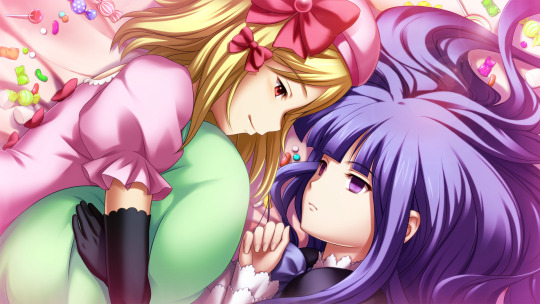
By the time, I was nearing the end of Umineko's eight main chapters, it had transformed from an intellectual battle between author and reader to an all-out war of a story against its community of readers who simply wanted to tear it down to cold, hard "facts." I had spent ten months and over 100 hours. The first half took eight of those months to get through (owing to a few lengths in Episodes 2 and 4), I finished the second half in less than two despite my busy schedule. I even dedicated a whole 15-hour marathon to the final episode as I was too glued to the grand finale to move away from it.
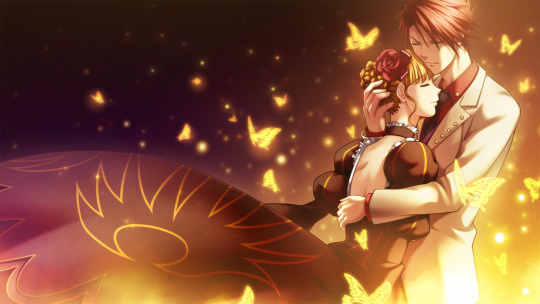
A new me came out the end. I no longer had an interest in tearing apart media for minor missteps. I enjoyed them much more deeply and honestly and began taking my time with the things I consumed. Instead of filling my plate at the buffet of stories as much as I could, I gave each dish its own course on the menu so I could appreciate its flavor in a different way — one bite at a time and not stuffed up simply to give the outward appearance of a seasoned gourmet. And for that, I will never be able to thank Ryukishi07 and his co-creators at 07thExpansion enough.
"The point of theory-making is not to create a culprit or to trample the truths that lie in the hearts of those who have not sinned. If you want to play detective, don't neglect the heart. Otherwise, we're just intellectual rapists. Don't forget it!!" - Willard H. Wright
If you are interested in reading Umineko When They Cry, you can find both its Question Arcs and its Answer Arcs on Steam, GOG, and MangaGamer. You can also read the manga adaptation digitally on Bookwalker (though I personally recommend the visual novel for its award-worthy soundtrack alone).
What work of fiction has touched your life in a profound way? Tell us in the comments!

René Kayser works for Crunchyroll as a PR and Social Media Manager in Germany. You can find him on Twitter @kayserlein where he tries to get people into Umineko every single day.
Do you love writing? Do you love anime? If you have an idea for a features story, pitch it to Crunchyroll Features!
22 notes
·
View notes
Note
Hi. I used to follow your old blog on a different account. Hope you're doing well. Do you have any tips on thinking up stories that are *not* dark and depressing due to subject material? The last story I was working on I had to quit because the backstory I was developing for my passive male character was super depressing. At times I enjoyed researching it, though what won out was the thought I was wasting my time looking into angsty things for something I wasn't even planning to publish. Now I want to write something a little happier. But I have the most experience in writing angst and cringe comedy 😅 thanks for any help you can give. Stay safe out there!
By the way, good on you for dropping that manga you used to follow. I was happy most of the characters lived, but other than that, it felt "meh" to me (granted, I didn't read all the way from the beginning). The author was probably going for a "people will always be fighting each other" theme, but some of the imagery of what happened after a time skip could definitely be taken as pro-fascist. And I was disappointed the protagonist basically said he wanted to bring about destruction! I'm glad I didn't spend any money to read it.
Wow, hi! I’m doing all right, thanks for asking. I hope you’re doing all right, too. :)
As far as “that manga” goes, I’ve kept tabs on it. I’ve been on the fringes for the last two-ish years; I dedicated something like four real life years to that fandom and mostly had a good time while I was there (made some friends I hope to keep for life), so it was one of those situations where I just had to find out how it ended. I realized at some point that I was in a very negative space in the fandom, and felt it was better to publicly drop the series and the blog associated with all of my meta/discussion than to play in what had become a toxic pool for me. I didn’t really want to drop the account after my time there, but I couldn’t have dealt with the nonstop questions/messages/etc that would have piled in over the years, and eh, when you’re done you’re done. I criticize Hallmark television for fun, now, instead. It’s a lot less stressful! And literally nothing is That Deep so there’s very few delusions, at least on the Tumblr side of things. (Reddit, however, is insane, but I don’t post in the fandom there.)
As far as writing advice goes, I am going to apologize in advance for muddled thoughts. I just got out of work and have been staring at numbers all day, so it’s hard for me to think lmaoo.
In my opinion, any sort of character or personality type/flaw/whatever could have developed via a negative OR positive influence/catalyst, so that’s something to consider. I also think people tend to reach for “sad” or “traumatic” pasts either as a way to cope with their own issues/pasts/whatevers, or because it’s the “easy explanation” for why a character is the way they are.
If you WANT to write things a certain way, it’s sometimes a matter of changing the lens through which you’re viewing life, the story, the characters, or character writing in general. This is never easy, especially when you find a genre you feel comfortable in, but it’s always possible. When I was in college and submitted an autobiographical piece (Rot Tooth) for a creative writing final, I received multiple comments from classmates and even the professor that my talent/skill was in writing comedy. COMEDY!!!! I don’t think anyone who has read my writing from the last decade would say that I was a comedy writer. I stopped labeling ‘fics as humor/romance so long ago I can’t even remember when it was. But boom. I had written a comedy piece.
I don’t think I can ignore that most of the comedic elements in Rot Tooth were brought about because humor is one of the ways in which I cope with things, but it was also a very conscious choice I made. I wanted people to be able to engage with the story without being grossed out, without getting bored, without feeling that it was a poor-pathetic-me story, and humor was the classiest way to do it. Here, read this long story that includes journal entries from Ye Olde Livejournal days, but it will make you laugh often enough that the depressing aspects of the story don’t weigh it down too much! It was probably the only way to make the subject matter widely palatable.
As often as I joke about characters or scenes or moments that “just write themselves” the author does have control. I mostly write fanfiction, so let’s go with examples from that.
I’m (very slowly) working on a ‘fic called Three Years which features a character who, when last seen, was headed off to serve a prison sentence. They haven’t been on the show for three years and thus I assume they have been serving that sentence for the last three years. The story starts when this character is released from prison. They are a woman. This is a historical piece of fiction. Prisons were vile to women and yet...this is fiction. I have a choice. I get to choose. Does she get to start her life off carrying 25 bags of trauma or just 2? It would be unreasonable to expect that someone, especially a woman, who was imprisoned for 3 years in the early 1900s wouldn’t have some issues (at the very least, the isolation would have been awful), but it doesn’t really have to be much worse than that. It doesn’t.
I have the power to choose.
A character has anger issues. Sure, he could have had a traumatic past with an abusive parent who took his anger out on him or his mom or whatever...or maybe it is an inherited personality trait and the parent figure with the problem was never really That Bad about it, but seeing it normalized makes it harder for the character in question to realize it’s a huge problem and part of their character arc is realizing they need to get help, not because they don’t want to be like their dad, and not because they hate their dad, but because they just want to be a better person/they don’t want to let that struggle consume them.
Someone’s sweetheart goes off to war. Guess what? They don’t have to die there to force a traumatic past. They don’t have to come back a raging alcoholic either. Maybe the time apart, and the time fighting a war just puts a natural sort of crack in the relationship by making it clearer to each character what they want in life/what matters to them in their life.
A character is super passionate about their work/hobby. Maybe they have ADHD and it’s a hyperfixation. Maybe they’re autistic and it’s a Special Interest. It doesn’t have to be “their parents ignored them and forced them to be alone all the time and they used this thing to cope so it means everything to them because it’s always been there.”
Maybe you have a character whose greatest fear is losing the people they love. It doesn’t have to be because a pet died in their arms when they were four and it traumatized them. It doesn’t have to be because they only have one person they love in the whole world. It can just be a thing because that’s a valid fear literally anyone can reasonably have, and maybe it’s a bigger deal because they don’t have siblings or aren’t close to many people! (And the “aren’t close to many people” thing doesn’t have to stem from trauma, either. Most busy adults for example who get to choose their friends, are just like that.)
A perfectionist might just have the personality type; it doesn’t mean their parents criticized everything they ever did. A person with three failed marriages might hesitate to fall in love and try again but it doesn’t have to be because those three failed marriages were abusive. A quiet character may just be shy or introverted by nature.
I think everyone carries some kind of trauma with them, so it’s never unreasonable to have some in a person’s past (you can’t write an ugly character without having to think about the fact that they carry some trauma from what it’s like to grow up ugly), but it doesn’t have to define them. It doesn’t have to overshadow everything else in their past.
You can always ask yourself, “Why am I reaching for angst every time I create a backstory?” Literally everyone has some kind of angst. Most kids were hurt by things said to them in school, for example, or made fun of for some reason. Most people did something extremely embarrassing as a kid and never got over it. There are a thousand little moments in our adult lives that go back to these little points—you might call them the tiny traumas. But they’re not defining. They’re not so heavy they also live in the present. Not all of them.
Why do you reach for the darkest corner? Why not for the light? Or a middle ground?
I encourage people to write basically whatever floats their boat, but it sounds like you’re at a point where you just feel weighed down by that sort of stuff, and that’s not a great way to feel, especially when it discourages you from working on a project entirely.
My final suggestion: look at some of your favorite characters from various types of media. Are they all traumatized? What are their defining characteristics? Black Beauty has some depressing stuff in it, but is ultimately a story with a happy ending. Pride and Prejudice has drama, but nobody’s past is filled with the darkest stuff imaginable. North and South has awful things to consider in it (cotton mills were sooo awful) but the characters are not wildly traumatized people.
What kind of story are you trying to tell? Do the characters need to be traumatized to tell it? Does the story have to be dark to get across the message you want to send?
Way back in the day, when I was into “that manga” I made an RP blog for a one-off character that nobody gave a damn about. Like, he was so one-off that even back in those days nobody even remembered him having existed. It was sort of a joke RP blog that wasn’t supposed to be serious. The only canon information we had about this character was that he enjoyed drinking. I decided to make him a lighthearted character because the series was pretty dark and I wanted to send people hilarious starters instead of wading through the muck of depression with everyone else’s sad, abused characters. I decided his family was old money and he had a brother. Nothing super traumatizing in his past. Some family issues but not the sort of thing that would haunt anyone. He was not traumatized in his recent past any more than other characters were. Mostly just “a regular guy.” I really loved RPing him. He was fun! The story could get heavy but he didn’t have to be.
Anyway, dive head-first into the dark angst if you want, but if it’s not necessary to tell the story you want to tell, just remember you don’t have to go there. You have the choice.
3 notes
·
View notes
Note
What’s your favorite composition by John Williams? And if you can’t choose just one, list your top 10.
My personal favorite is “Welcome to Jurassic Park,” the finale and credits music for the original Jurassic Park. I love the Jurassic Park theme, and this is a great suite of it combined with the ‘island theme.’ I like it even better than the concert versions of the same combination, as I think those are performed too quickly, even when Williams conducts.
And since I love talking about this, I’m also going to keep going for a top 10! Yay!
“Adventures on Earth” (from ‘E.T. the Extra Terrestrial’): Again, this is the finale and credits, which touches on all the great themes from the movie and includes the big, rousing, emotional climax. It’s funny- just two days ago I was talking about how everyone was comparing the end of Mandalorian Season 2 to the ending of E.T., and I speculated that the reason it didn’t work as well for me as everyone else is because Ludwig Göransson, while a great composer, just doesn’t do that Spielberg-sentimentality as well as Williams. But then, no one does.
“A New Hope and End Credits” (from ‘Star Wars: Revenge of the Sith’): I’m cheating with this one. I love the Star Wars music. It’s what made me aware of John Williams in the first place, and it got me to realize that the reason I wasn’t excited by all the pop music that my peers were into wasn’t because I disliked music- I just didn’t like that music. Star Wars taught me that I like the full, complicated performance of an orchestra, that the different sounds of the various instruments intrigue me more than lyrics (which I have to concentrate to understand), and that I like storytelling in music. Star Wars is probably the ultimate expression of that in the career of John Williams, not just because of how thematic it is, but also the breadth afforded by his doing nine movies spread across over 40 years. So how do I pick something to represent that? The main theme? The recurring Force theme? A suite? Yes, I have to go with a suite. But which one? I went with the one from the finale of ‘Revenge of the Sith’ for several reasons. It includes nice expressions of the themes of Leia and Luke, referencing the classic trilogy. It has “Battle of the Heroes,” which I consider one of the standouts of the prequel trilogy. And, for the soundtrack release, this suite includes pretty much all of the expanded version of “The Throne Room” from the very first Star Wars movie, which I feel was a great way for John Williams to take a bow at the end of a trilogy that can be criticized for many things but absolutely not the soundtrack. (By comparison, the soundtrack release for ‘Rise of Skywalker’ was a bit of an anti-climax, as Williams’ last Star Wars movie. That should have included a whole second CD that’s just an hour-long suite of music from the entire 9-film saga! Disney could have afford to take a loss on it! If they’re not going to release properly restored versions of the full series’ soundtracks, they owe to the John Williams fans!) And, of course, there are multiple expression of the Force theme in this piece, from the ‘binary sunset’ final scene of the movie itself to the B-segment of “Battle of the Heroes” to various parts of “The Throne Room,” and that theme might very well be the signature of the series at this point, since it has meaningful recurrence throughout the saga. The main Star Wars theme is Luke’s theme, and is reused throughout the saga as callbacks and call-forwards to that same kind of heroism, but George Lucas kind of messed up the focus there when he expanded things with the prequels. So the Force them is really the dominant theme in the saga, and that’s appropriate. I probably could have selected just the Force theme for this, but by cheating and picking a suite, I get other stuff, too, and get to acknowledge the prequel-era music (which is arguably superior to Williams’ work on the classic trilogy), so it’s a win all around.
“Out to Sea / The Shark Cage Fugue” (from ‘Jaws’): I think we have to recognize that John Williams has made an indelible mark on all of human culture- it is impossible for us include a shark in our media without a pulsating musical motif. He has literally defined the sound of sharks in our imagination. Even so, I think the soundtrack to Jaws is under-valued; sure, everyone knows the shark theme, and there’s no big thematic stuff like in Star Wars or super-emotional stuff like in most of the Spielberg scores, but it’s still a great soundtrack with really solid adventuring music that’s so wonderfully lively and fun to listen to. This suite is a great example of that, mixing samples from the second half of the movie with lighthearted moments, some of the more action-y chase music, and some darker stuff like when the ship is destroyed by the shark. I’ll often just whistle parts of this for fun even if I haven’t listened to the soundtrack or watched Jaws in over a year.
“The Visitors / Bye / End Titles” (from ‘Close Encounters of the Third Kind’): People are sleeping on this soundtrack, let me tell you. It starts out with weird alien sounds and standard action music, but the ending -- where mankind makes peaceful contact with aliens via the medium of music -- is one of the standouts of Williams’ entire career, one of the greatest examples of that Spielberg sentimentality. I find this music to be absolutely glorious, majestic and full and transcendent. The little joke of having an instrumental recurrence of “When You Wish Upon A Star” along with the ‘five tones’ motif is something I find actively amusing- wish upon a star, and alien life with reach out in response! XD I wish I could have linked to some of the alternate arrangements from the restored 40th Anniversary release from La La Land Records, because they’re absolutely fabulous and I love blaring them on my car’s speakers, but it seems that no one has pirated and posted them on Youtube. WHAT ARE PEOPLE DOING WITH THEIR TIME?!
“Remembering Childhood” (from ‘Hook’): Look, I don’t care what people think of the movie. I haven’t even watched it all the way through in over a decade, probably. But this is one of Williams’ best scores, no fooling. I want a 5-CD expanded soundtrack of this thing with every second of music from the film, the stuff that was recorded that didn’t make the final cut, alternate versions of the stuff that was used, etc. I love this music. Every moment is great. And Remembering Childhood is one of the standouts; it uses the main flying theme at the end, and the beginning is a big triumphant instrumental rendition of the “When You’re Alone” song that sounds great. But the showcase is the stuff that accompanies Peter Banning getting his memories back and becoming Peter Pan once again. It’s emotional and reflective and nostalgic and heartwarming. It’s a perfect musical sandwich.
“Prelude and Main Title March” (from ‘Superman’): Just like John Williams invented the sound of sharks, he invented the sound of cinematic superheroes with his score for Superman. It’s the perfect embodiment of the first and ultimate superhero, and everything that’s been written for the character since has either been a pale imitation or a deliberate attempt to do something different (to lesser effect). And I love the exuberant sound it has, like it’s shouting, “It’s Superman!”
“Love Theme” (from ‘Superman’): Two from Superman?! I didn’t even mange to fit two from Star Wars and had to resort to a suite! (Not that Superman isn’t one of Williams’ best. It’s great.) However, I feel like I had to include this one. Lots of movies have love themes, and Williams himself has written a bunch. But IMO the Love Theme From Superman is the best of them. I’ve never been in love and I don’t ever expect to be, but I have to imagine that this is what love sounds like.
“Theme from Schindler’s List”: There’s a lot of music on this list that’s warm and positive and exciting, but John Williams is also great at quieter stuff, without losing any of emotion. I think the theme from ‘Schindler’s List’ is probably the preeminent example of that, perfectly mournful and full of the proper sound, a unique sound that’s completely unmistakable. Of course, Itzhak Perlman‘s performance is a huge part of that. The theme is still good when played by others, but there’s something special about Perlman’s rendition.
“A New Beginning” (from ‘Minority Report’): Another finale, but this one isn’t a summary of the rest of the movie’s music like the others. It’s a fairly stand-alone piece, but I just love the sound of it. I’m never getting married and I don’t dance, but this is totally going to be the music for the first dance at my wedding reception.
If anyone else has favorites from John Williams’ oeuvre, feel to reply or reblog with additions. I’d love an excuse to re-listen to those.
#Anonymous#you have no idea how agonizing i found making this list#it feels like a crime that raider's march isn't here#but this was a cutthroat competition
2 notes
·
View notes
Note
Hey, I was looking for some new reading material and wondered if you could give me some recs? Please and thank you sm!
ho BOY anon, COULD I! I’ve got over 2,000 bookmarks on AO3 - what are we looking for? I’m going to assume IronDad, or at the very least Peter Parker-centric; short or long? MJ or Gwen Stacy? Angst, fluff, whump? Sorry this took a minute; I went into the vault for you and pulled out some rare gems:
LONG FICS
In the Home by @captainkirkk | 68k
The Avengers have been infected, turned violent and aggressive against their will. And Peter, the only one unaffected, is trapped inside the Tower with six feral teammates.
“Natasha,” Peter says cautiously, “what happened here? Steve attacked me, and if there was ever a sign that something was wrong, it’s having the embodiment of Truth, Justice, and the American Way throw you across the room—”
Natasha comes closer, her stride controlled. Nothing necessarily out of the ordinary, but there’s something in her face, in her eyes—
Natasha lunges across the space, and slams into Peter, hard.
This just…hoo. A classic if I’ve ever seen one. There’s going to be plenty of aloneintherain on this list because she’s the bomb dot com and its no secret I’m in love. we Stan in this house; this might be my favorite Spidey fic ever written.
POW Avengers by Punny_Puck |122k
Tony Stark is thrown into a new Nazi POW camp. It’s his fifth–or sixth–and he’d really like to make it to his fiftieth escape attempt this time. But Stalag III isn’t like any of the other POW camps he’s been in. He suddenly finds himself facing an impossible task: Getting two-hundred and fifty men out of the camp in one massive escape attempt. And dammit if he’s not going to make it work.
Very impressive, very lengthy and detailed historical AU set in WWII. This one is more Tony than Peter, and quite a fair bit of Loki (this author does a great job with all the different POV’s, that’s why it’s so long!). Nice and juicy!
5 Times Peter Fell & Tony Caught Him, and The 1 Time He Didn’t by eva7673 | 35k
Peter has a nasty habit of falling. And Tony, bless him, will catch him every. single. time. Until the day he can’t.
I love this series with all of my heart, but especially this first fic! It’s the perfect amount of whump and IronDad, and oh man, that last time? GETS me. Eva definitely put in so much work on this series, and it SHOWS!
Twelve Days of Peter Parker by @upcamethesun | 27k
In each of the twelve days leading up to Christmas, Tony runs into one Peter Parker — for better or for worse.
In other words, an excuse for this author to write gratuitous Peter fluff/angst/nonsense with a Christmas theme, because ‘tis the season.
This fic is so cute I Die. Perfect bit of holiday nonsense! I read it every year lol. It’s got everything you’re looking for and more, to scratch the itch you didn’t know you had.
ever in your favor by @iron–spider | 153k
Peter startles awake when someone shakes him.
“Sorry, honey,” May says. Peter blinks a couple times and she comes into focus, her hair pulled back from her face. She’s trying not to look a certain way, but he can see it in her eyes anyway. She clears her throat, keeps talking. “But it’s…” She glances away, wets her lips. “You gotta get ready.”
He remembers what day it is, and his heart beats like a drum at someone’s execution. But he tries to put on a mask, make it all seem normal. It’s everything but, despite the fact that he’s been dealing with reaping day since he was born, between himself, Ben and May. That fear that one of them could be taken away. Sent to surefire slaughter. But now Ben is gone, taken despite never having his name drawn from a bowl, and May’s finally safe. Now Peter’s name is in there alone. The last Parker sitting on the chopping block. He doesn’t know how to be. He doesn’t know what normal is, when the Hunger Games are looming on the horizon.
I mean…how could I possibly do a fic rec list without this on it? Iron–spider’s latest masterwork, and it truly is a masterwork. The Hunger Games AU your soul has been crying out for, and quite possibly the greatest AU to ever live. Do yourself a favor and get settled in - you’re in for a ride.
Magazineverse by @copperbadge | 56k
Heroes In Manhattan: From Captain America’s Hidden Talents To The Truth About The Hulk, We Debunk The Myths And Expose The Daily Lives Of The Avengers.
Avengers-centric, takes place post-2012. The Avengers team we deserve! The whole series is amazing, and I definitely didn’t see the twist coming (SO original, and you totally got me. Well played.)
MEDIUM FICS
devil in a sunday hat by @captainkirkk | 14k
Peter wishes he hadn’t gotten out of bed that morning. Then, maybe, he wouldn’t be reduced to this—limp-crawling through the rabbit burrows that is Oscorp Tower, a monster of a man on his heels, bloody and bruised and choking on a panic attack.
This series really speaks to Peter, and his experience as a street-level hero. I don’t think I’ve ever not cried reading this series - it’s really beautiful. Aloneintherain always manages to capture how much weight and anxiety sits on Peter’s shoulders - and how dire his consequences can really be.
5 things that change for Peter after the end of the world by @iron–spider | 14k
…and one thing that always remains the same.
(SPOILERS FOR INFINITY WAR)
Peter knows he’s different now.
The first three months were like a bubble. He didn’t think about the newness of his old life, he didn’t think about the state of the world now that it had been saved—he just worried. Worried about Tony and Steve recovering. Worried about May worrying about him. Worried about everything in general—he didn’t allow himself specifics because specifics didn’t make sense, not yet. He just focused on his routine, kept it normal, the same schedule every day so he didn’t throw himself off.
It felt like the bubble popped when the party ended, and everything became clearer. The differences in who he is now were highlighted, like there was a spotlight on his every move, like everybody could see the invisible scars the world-ending experience left on him.
The first thing he notices is the sleeping. Or lack thereof.
(a follow up to my story “the rattle of their hearts” from Peter’s POV. You can read this one without having read the original, but it would make more sense if you have read it!)
Everyone knows Rattle, and if you don’t, definitely read the first fic in this series! But this second one is really special to me (and MJ never fails to make me laugh out loud, every time). Peter’s PTSD is dealt with intimately in this fic, and I love it to bits.
the conspiracy kids by @tempestaurora | 13k
WHO IS SPIDER-MAN?
The screen showed Peter Parker, sixteen years old and determined to prove the identity of Spider-Man over the course of the three-part documentary he was making, unknowing that it would become viral within days of the first part being released. Behind the camera, way off screen, was Harley Keener, Tony Stark’s other prodigy child, grinning like crazy as Peter started the documentary. Only a few people knew what was to come, and those few people were about to have a great few weeks.
“My name is Peter Parker, and with the help of my friends, Ned Leeds, Harley Keener, and my Aunt, May Parker, who provided me with a lot of red yarn for this project, we’re going to uncover the identity of Spider-Man.”
OR
“what if peter just decided to fuck with everyone who didn’t know he was spider man and make a documentary about him trying to uncover the Truth.”
Looking for a fun, Peter-and-Harley-being-ridiculous-teenagers fic? This is the One For You. I can see it all in my head, and it never fails to make me laugh. Delightful piece of fluff and probably the best social-media-esque fic I’ve read.
Primary Reason Tony Stark Would Throw Down With An Anti-Vaxxer In The Street by @caraminha | 12k
Prompt from my Tumblr: Have you heard of tetanus? I’m studying it for school and it’s got lots of angst potential - it causes severe, seizure like muscle spasms which can break the patient’s bones, but they’re conscious and fully aware of what’s happening. It also causes fever and lockjaw, and difficulty breathing. I’d love to see an angst fic where Peter has bad tetanus and Tony and co are looking after him whilst his symptoms get worse and worse.
Looking for some Peter!whump? This fic is so sweet. Tony is Dad. What more do you need?
SHORT FICS
Come Together by @captainkirkk | 1.8k
From the ground, Tony squints at Thanos and the young heroes the villain is chasing through the city. “Are they…” Tony begins.
Steve, being lifted onto a gurney by starstruck paramedics, laughs a little. “Leading the man who almost destroyed the Earth in a wild goose chase?” In the sky, Johnny Storm sticks his tongue out at Thanos, ducking and weaving out of the villain’s grasp. “Yeah. I think they are.”
Didn’t I promise she’d be on here a billion and one times? All of her stuff is so good, for every fandom. Go READ this queen who’s been killing the game for years. This fic is such a sweet one, an Endgame fic before Peter was even in the MCU. It’s perfect.
Only Road by @garamonder | 2.8k
A rare breather between fighting should have been a relief for the Avengers. Instead, one small comment triggers a confrontation Peter had been avoiding for months.
Oh wow this one…this dialogue between Peter and Tony is incredible. One of my favorite things in a fic is a good argument, especially one where Peter has a distinct and mature point.
Every Penny and More by Princessfbi | 1.2k
She forced herself to inhale air and hold it before releasing it from her lips. She grounded herself in the cheap vinyl in a crappy diner that she wasn’t sure she was ever going to be able to look at the same way again. She thought of the life Peter would have if she said yes because she knew that’s what all of this was about: Tony asking her permission to let him do this.
May and Tony co-parenting Peter is…oh, be still my heart. This is such a sweet little fic of something that definitely happened off-screen :’)
5 Times Spider-Man Saved An Avengers’ Ass (and the 1 Time They Saved Him) by TunaFishChris | 7.2k
What it says on the tin.
Going through an angsty Spider-Man phase. I regret nothing.
YES give me Peter x Avengers team! Peter gets a great moment with each of the Avengers, proving himself a capable hero (and getting assistance when he needs it the most :’) baby makes some friends!). Really cute, a fun little romp.
unbearable loss by @iron–spider | 1.6k
“Peter…he was so afraid, Pep,” Tony says, his voice breaking. “He…he just lunged for me, he was so afraid, he wanted—he needed someone to be there for him. And I tried, I tried—I held him, I told him he was alright, which was a—goddamn lie, and the only fucking thing that came out of my mouth. The last thing I said to him.” He shakes his head, swallowing hard. “The last thing I said to him was a lie.”
“You can’t blame yourself,” Pepper says, quietly.
“I do,” Tony says. “He trusted me. That kid trusted me, and I failed him every possible way I could have. I couldn’t save him, I couldn’t—he died in my arms and I couldn’t do one single solitary thing about it. And I couldn’t—me, the human fucking chatterbox—I just stared at him. He was dying, turning to fucking dust and apologizing to me and I just stared at him, like a moron.”
This fic Fucks. Me. Up. Iron–spider’s Tony angst is unparalleled. It hurts me every time, and the dialogue between him and Pepper is just…it’ll get you.
yesterday, I saw a change by @captainkirkk | 6.8k
Inspired by prompt: ‘Peter is unmasked on live television, and everyone goes berserk—you’ve already heard this one but here’s the twist—he’s wide-eyed, staring into the camera, frightened, but not because of his own safety. The first thing that comes out of his mouth is, “Someone please, please protect my Aunt May.” And the entirety of New York cries out simultaneously. Heroes and neighbours and fellow students rain down on the Parker house, ready to defend her.’
This is - surprise! - a May Parker fic. This fic will move you. You will probably cry. I love it with all my heart. If I ever need a refresher on who May is and how she feels - how New York feels, about Spiderman - this is my go-to.
Hope that gave you some new stuff to check out! I have more, do I ever have more. Enjoy & remember to leave comments for all of these wonderful writers!!!
#fic rec#i speaketh#thwippity thwip#anon#ask#aloneintherain#iron--spider#punny_puck#eva7673#upcamethesun#copperbadge#tempestaurora#caraminha#garamonder#princessfbi#tunafishchris#irondad#spideyson#irondad and spiderson#peter parker#spiderman#tony stark#may parker#aunt may#avengers#marvel#mcu#fic#fanfic#fanfiction
236 notes
·
View notes
Text
2021.01.10: Redcaps and Manga Reviewing, Vigor and Nostalgia
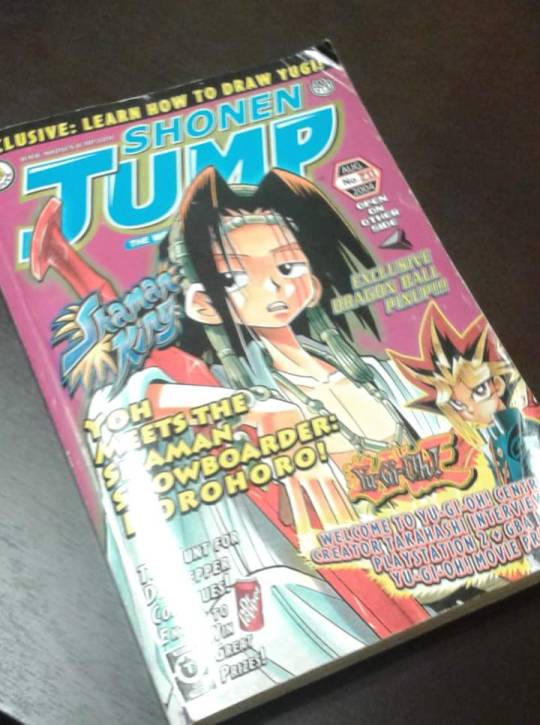
Alright, so what happened this week?
Well, I don’t think I’ll ever forget what happened this week. I was six when September 11th occurred, so I wasn’t really cognizant of what had happened. But I am cognizant now. And I won’t forget what happened on January 6th for a very long time. I don’t consider myself especially patriotic or loyal to the democratic system of government as it operates in this country, but I do acknowledge when something so sacrosanct is violated.
I don’t want to spend time getting into this. If you’re old enough to find this blog post you’re old enough to know what happen. I hadn’t intended for that to be what I wanted to talk about anyway.
Where I left off last week, I wanted to announce my intention of making a video on Shaman King.
There are a number of hurdles—some might even dare to call them issues—with this idea. I’m not a reviewer. I don’t have any video editing experience. I don’t have a platform of great enough scale to protect my work. And, for the nature of what I intend to write, I may not even have enough time to get it out before the series drops in April.
So why bother?
Because I love the series. For years, it almost never came up in conversation, but when it did, I was pumped up with the nostalgia I had while reading it. I didn’t know where this excitement came from for years.
It’s a good manga. Not the best that there ever was, but yet I inexplicably loved it. And I didn’t really know why. But when I was asked what my favorite manga of all time was my answer would be Shaman King.
When I heard the anime was getting a re-release and when I heard they were going to re-publish the manga in full this time, I was ecstatic. I told my friend about it and, being the type of person who’s typically late regarding news related to anime releases, they already knew.
Then, I saw the articles. And my heart ached.
Read my article about how Shaman King is pulling a Fullmetal Alchemist Brotherhood.
Read my article about ten characters that will be in this anime that weren’t in the original.
Read about whether or not this character is okay for woke 2021.
And I my stomach sinks when I think about what will be coming next.
Theories made by people who read the series and are reciting spoilers for clicks.
Essays on why Hao is the greatest anime villain of all time for clicks.
Speculation on whether or not Yoh can beat Goku in a fight.
I don’t have a very high opinion of journalism. And knowing that the series I love will be used and disposed of for quick clicks is upsetting to me.
In deciding to do this project, I put it all together. I realized why I loved this series.
When I drew as a youngster, Shaman King’s stab-your-eye-out-on-my-protagonist’s-edges art was my early influence for character design.
Every story I’ve come up with—whether or not it’s been continued, recycled into another idea, or wholly abandoned—has had themes of spirituality that I’d only seen present in Shaman King as a child watching it on the FoxBox.
It was my exposure to the reality that manga and anime don’t always coincide; I hadn’t watched FMA or FMAB yet.
I used to record the Saturday morning cartoons and watch them with my grandmother, and while for years I’d hop between Fox, the WB, and ABC recording cartoons so that we’d watch things like Lilo and Stitch, Foster’s Home for Imaginary Friends, the Proud Family, Xiaolin Showdown, Coconut Fred, Ultimate Muscle, Johnny Test, Mucha Lucha, Jackie Chan Adventures, even One Piece—to name what I could from the top of my head, these shows didn’t all run on these channels in the same breadth of time—I’d skip over Shaman King, keeping it selfishly to myself like a child would.
This week, it hurt watching a bunch of redneck monsters trample over the Capitol. As someone cynical of the government, it hurt to know something so sacrosanct could be treated so shamefully. But it hurts so much worse to imagine that I wasted all these years, like a boy concealing his affection for a girl until she falls into the arms of someone else, to actually take the time and express the love I have for this series.
The image of this post is an issue of Jump a buddy of mine bought at a thrift store or yard sale and gave me almost three years ago. I posted the picture with a long blurb about how my week feeling on Facebook. A lot of it is auxiliary, but I’d like to recount what I wrote here.
Spoiler alert, I was feeling a little pretentious that day:
“Vigor. Even writing this feels more cumbersome than it actually is.
How do I say what I mean? I hate nostalgia. It’s true, if hyperbolic. I see it cut down so many peers, creatives, and critics like a guillotine; a sloppy, artificially guided, swift force that lops their heads into a collective basket of thought.
Still, this past week I’ve felt my own dismissive chest opened with a more surgical precision that permissed” [NOT A WORD] “nostalgia to play with my heart strings. I reflected on Avatar, a show from a time when animated shows didn’t have their runtimes bisected for the simpler consumption of children that would choke on anything longer, that powered itself on the labor and inspired vision of its creators and crew as opposed to memes for the children and references for the adults, and had the temerity to demand that an audience be comfortable going thirty minutes at a time without a joke to amuse them.
My friend went to Pennsylvania and got me an issue of the now defunct Shonen Jump magazine from 2004. It had series of comics I’d forgotten about and an ad for Sam Raimi’s Spider-Man 2, but those were inconsequential. I find Shaman King to be the greatest comic I’ve ever read and in August, the month of the issue I’d received, the protagonist was featured prominently on the cover. I remembered how engrossing it was to read something with that level of complexity; taking into account my age. And never since have I seen a series with such a great balance of brutality and humor and never since have I seen any form of media where” [REDACTED FOR SPOILERS] “led to a happy ending.
To round it off, within the hours before writing this I’d watched Feel Good Inc. I couldn’t help but feel my eyes begin to water at the genius of Damon Albarn and Jamie Hewlett. An unforgettable song latticed with moments of haunting beauty and brilliance.
As a child I would sit down for hours to draw terribly. And I loved every warped, misshapen, humanoid, tailed thing I drew. I’d scan my grandmother’s cookbooks and write recipes by mending foods I liked together in a manner similar to Frankenstein assembling his monster. I wrote chapter after chapter of a terrible story because I wanted to prove to my first girlfriend that I could write something better than twilight. I had a sense of self-motivation. I hadn’t struggled through college for a year to graduate without confidence in my own abilities. Or lost friends to unfair circumstances beyond my control or the ignorance of how much control I had. Or been stressed to the point of genuine fear from some of my earlier work. In many ways I still feel like the child I was when I lived at my grandmother’s house. Except now as a child too anxious to do anything besides what he knows will keep him alive.
How do I say what I mean? Not well. That, too, may have been a bit too hyperbolic. It’s not that I hate nostalgia, but that I fear being stagnated in memories of better days. Still, like a failing vegetarian having a hamburger the time I’ve taken to indulge myself has let me realize something I’ve been missing from my diet.
Vigor.”
2 notes
·
View notes
Text
January 5, 2021: The Running Man (1987) (Part 1)
Arnold Schwarzenegger.
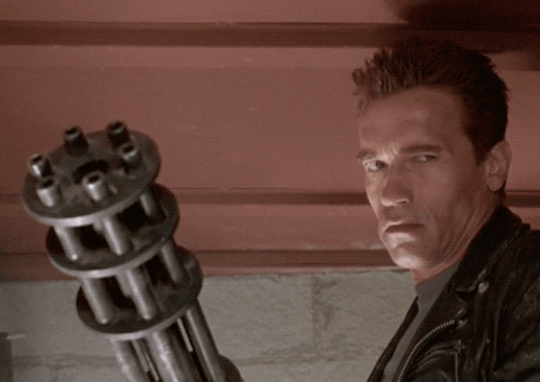
Stallone, I hadn’t seen a lot of, Arnie, on the other hand. Oh, I’ve seen plenty of Arnold Schwarzenegger. Conan the Barbarian, The Terminator, Commando, Predator, Total Recall, Terminator 2: Judgement Day, Jingle All the Way, Batman and Robin, and Terminator 3: Rise of the Machines fills my list of seen Arnie films. What’s missing?
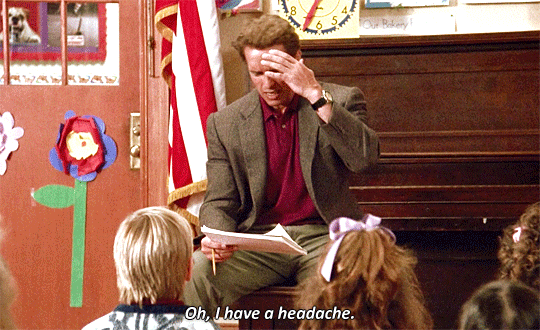
Kindergarten Cop, Twins, Junior, Last Action Hero, and True Lies certainly come to mind. And yeah, you might’ve noticed that those are all action-comedies. Two of these will be seen during Comedy April; one’s gonna be watched tomorrow. Of course, there are still other movies missing in that list above, but Schwarzenegger has a LOT of movies. And so, today, we’re going for one of his ‘80s action films, based off of a Stephen King story. That’d be a little movie called The Running Man.
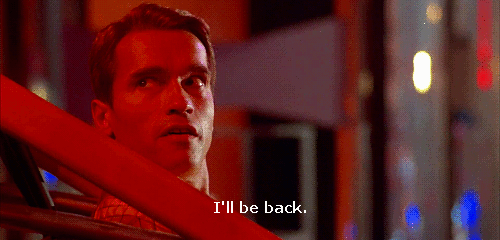
A movie set in the far-flung dystopian future of...2019...The Running Man is one of Schwarzenegger’s understated classics, at least as compared to his other dynamos of the era. All I know is, it’s his only major big pure action film of the time that’s slipped under my radar. I don’t have any particular expectations going in, but I’m expecting some typical Schwarzenanigans.
WARNING: SPOILERS AHEAD!
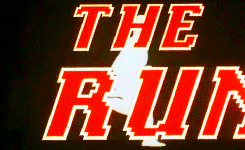
Recap
So, the global economy collapsed in 2017, eventually leading to a global police state and state-controlled television. High censorship reigns, and the most popular show (of all time, apparently) is a gladiator-type series called “The Running Man.” Any dissent is quickly crushed, which (naturally) has led to a small underground resistance movement, like it always does.

As we start, police helicopter pilot Ben Richards (Arnold Schwarzenegger), an authority figure with a conscience (unsurprisingly), using his vehicle (which operates off of the above seen UNIXSYSTEM (I know this)) to monitor and detect potential riots. Richards proceeds to defy orders to fire on innocent citizens who only want food, and gets knocked out by his coworkers.
We cut to 18 months later, where Richards is confined to a work camp, where people die, and nobody’s loved. They’re all wearing detonator collars, and I know the plot of the movie.
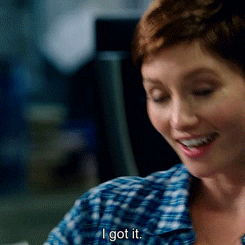
Seriously, the plot, the ending, Schwarzenegger’s role, it’s all done. I got it. I’ve seen this story a thousand times. He’s gonna be recruited to join the Running Man game show that the guards are talking about, escape just before they’re gonna kill him (probably), join up with the rebellion, bring new life into them, probably fall in love at some point, and then take down the head of the police state and/or the game show.
I got this. Which is a little disappointing, if I’m right. Automatically got some points against it, but hopefully I’ll still enjoy the ride.
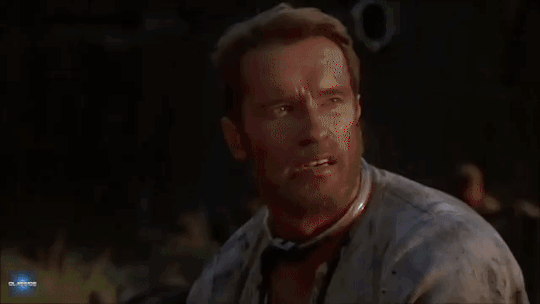
Anyway, back to the gulag. Schwarzenegger and another prisoner stage a fight, allowing the third prisoner to try hacking the perimeter fence that triggers the collars. After losing a guy so that we can see somebody’s head blow up, the perimeter is shut down, and all of the prisoners escape.
Meanwhile, in Los Angeles, we’re introduced to the Running Man, a DOJ-sponsored game show in which the contestants are “criminals, traitors, and enemies of the state,” who are essentially executed on national television. Dark. I like it. Our escapees meet up with the underground, and they get their collars taken off. Not wanting to get involved in any rebellion (yeah, OK, sure), Richards leaves the city. And he’s definitely never gonna come back for any reason.
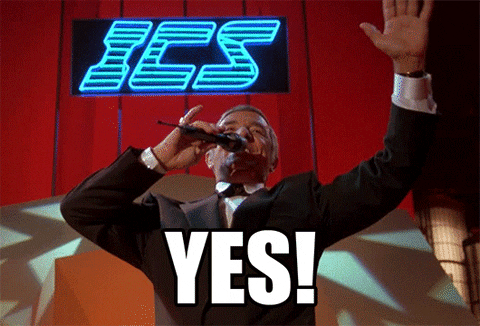
We now meet our villain of the piece, Damon Killian, played by the Kissing Bandit himself, Richard Dawson. And I’m not gonna lie, casting Dawson as the country’s greatest game show host is...great, it’s great, it’s one of my favorite casting choices so far this month. Dawson, for those of you who didn’t know, was the first host of Family Feud. He also had a well-known penchant for kissing the female contestants that came on the show. That’s how he earned the moniker, “The Kissing Bandit.” And yeah, it was a little creepy, in retrospect.
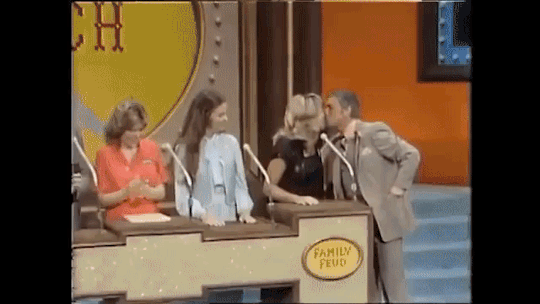
Killian immediately comes off as a two-faced slime, and I am more ready for this character than I have ever been. I mean, an evil game show host? SOLD! If they ever remake this movie, I would give good money to see either John O’Hurley or (please, please) Steve Harvey take up this role, since both have been Family Feud hosts. Could you imagine?

We also meet Amber, our inevitable love interest played by Maria Conchita Alonso, who’s watching the news, with Ben’s face on it. We learn that he’s known as the “Butcher of Bakersfield,” being framed as a “maniac” who fired on innocent civilians (when, of course, that’s what he was trying to prevent. I feel like there’s a comment on the media to be made here, but I ain’t gonna make it. Yet.). Amber now lives in his brother’s apartment, as he was taken for reeducation. I’m sure he’s fine.
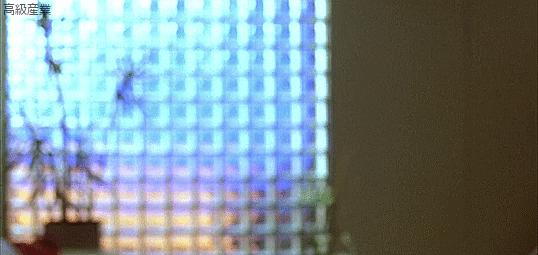
Killian sees footage of the escape, wants Ben Richards for the show, and immediately calls the President’s agent to make it happen. I love it. Richards, in the meanwhile, coerces a tied up Amber to help him get out of the city. We get to see the treat of a 6′4″ Austrian man wearing a badly-fitting Hawaiian shirt, which just looks ridiculous, and I appreciate it.
It immediately doesn’t work, and she rats him out, leading to his inevitable capture by the cops, and to our hero meeting our villain for the first time.
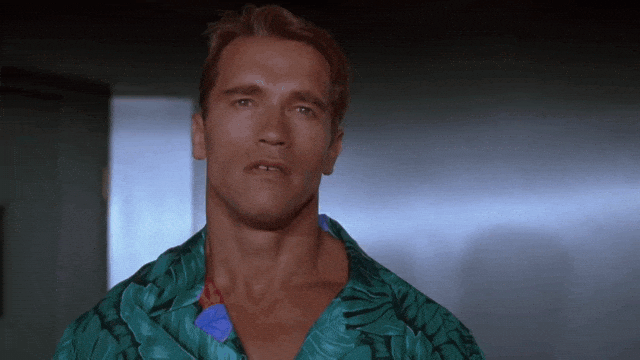
Dawson makes Ben an offer he can’t refuse, having kidnapped his prison friends in order to coerce Ben to compete in his show, “The Running Man.” Ben agrees, and is subjected to a medical procedure and sedated. Amber, in the meantime, starts to realize that the government sucks, and might be framing Richards. And then, Climbing For Dollars comes on.
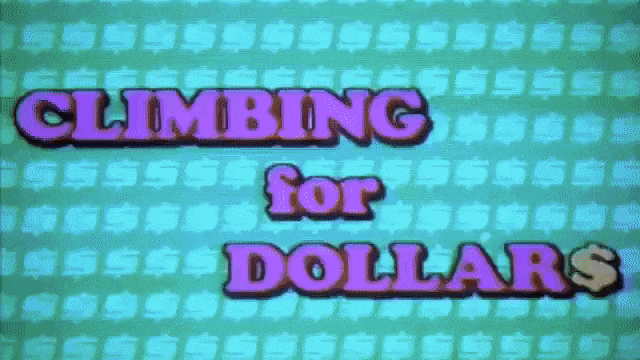
I am more confident than I should that that show either does or will exist. Bet.
Anyway, Ben “The Butcher of Bakersfield” is the main attraction on the show tonight! We get a montage of women dancing on a darkened stage in ‘80s tights, choreographed by original American idol judge, Paula Abdul! Small world, that.
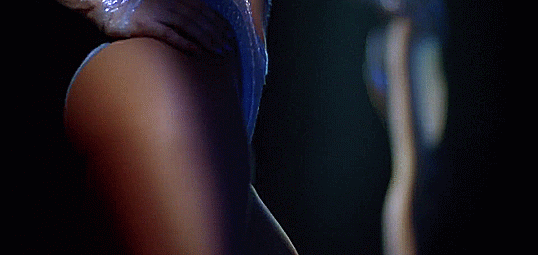
Damon Killian comes on stage, pouring on the smarmy charm to the audience, on and off screen. Something about how slimy he is just reeks 80s, and I’m living for it. Ben Richards is introduced using a bit of edited footage framing him as the Butcher, which also places Killian as an avenger and hero of the people, which...yeah, continuing to dig it. The audience jeers as the dancers parade around him in theater, eventually revealing...
I can’t decide if he looks terrible or fantastic in this outfit.
It’s revealed then that Killian’s double-crossed Ben (unsurprisingly), and his friends have been brought to compete in the game regardless. It’s also revealed that the “Runners” will be pursued by the “Stalkers.” And if they survive, they could win prizes like a fair trial, or maybe even a pardon if they get far enough! Whoof. This is a rough dystopia, and one with enough tinges of reality, that it’s palpable. BUT ANYWAY! It’s time to start running!
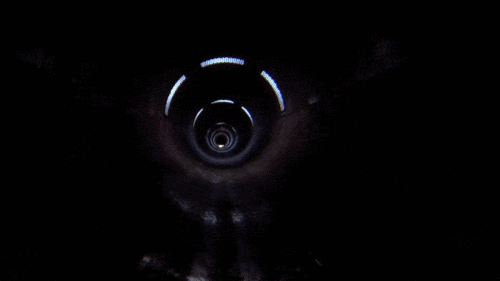
The guys are shot down a sick-looking bullet tube that’s almost certainly given someone an epileptic seizure in the past, and they exit into the mean streets of Los Angeles. Edith from the show audience picks the first Stalker to go out and hunt them down: Subzero.
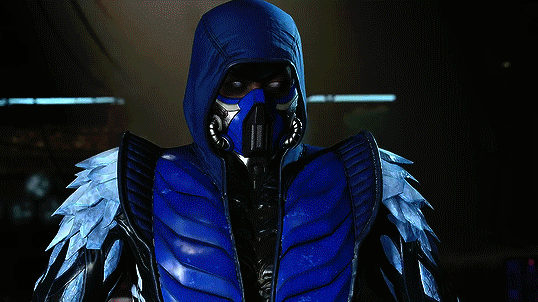
Actually, this is Professor Subzero, played by Professor Toru Tanaka, a professional wrestler of the day. The group meet him in a hockey rink, where he’s covered in armor, carries a weaponized hockey stick, and uses explosive hockey pucks like a GODDAMN BATMAN VILLAIN.
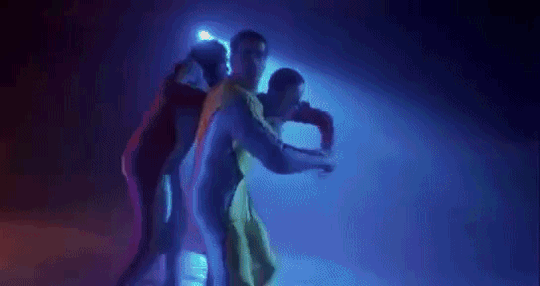
I love this movie.
Well, the future Mister Freeze kills Professor SubZero, Because there can only be one ice-themed supervillain here. This is also the first time a Stalker has been killed in the show’s history. And wow, Ben is making himself look REAL bad. Both because of killing a Stalker, and by spitting out TWO shitty action movie lines in a row.
Ratings are up, Amber gets caught proving Ben’s innocence, and the next two Stalkers are chosen. One is Buzzsaw, armed with a chainsaw and super-strength.
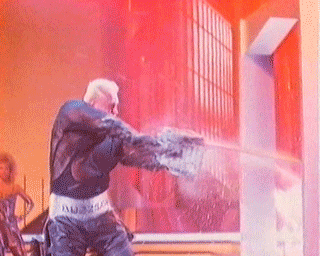
The other is Dynamo, a GODDAMN OPERA SINGER WITH A METAL MOHAWK WEARING A SUIT THAT GRANTS HIM ELECTROKINESIS.
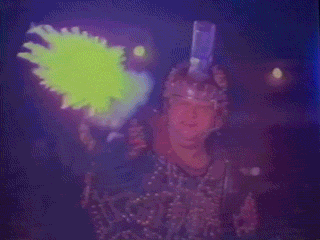
This film is our greatest achievement as a species. I am crying. I’m gonna need a minute.
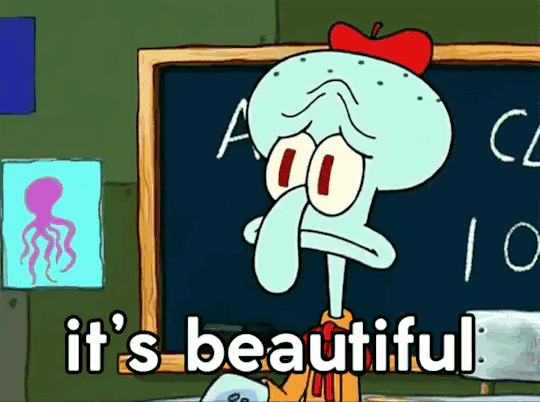
Part II coming later today!
#the running man#stephen king#arnold schwarzenegger#paul michael glaser#maria conchita alonso#richard dawson#jesse ventura#ben richards#action#dystopia#dystopian#action genre#action movie#dystopian action#365 movie challenge#365 movies 365 days#365 Days 365 Movies#movie challenge#a movie a day#a year at the movies#a year at the cinema#movie essay#movie essays#movie review#movie recap#gameraboy1#stream#userstream#action january
3 notes
·
View notes
Text
My Five Most Influential
Someone asked:
Who are the most influential writers in your life?
Good question.
The broad answer is that one gets influenced many different ways by many different sources. I enjoy poetry and song lyrics because they find ways of conveying the strongest emotional content in the most concise manner, music brings a sense of dramatic rhythm and fulfillment, the visual arts suggest ways of subtly adding many insights to a single strong idea, etc., etc., and of course, etc. (and that is also an example of a creative influence in my work).
But…to boil it down to those whom I most consciously made an effort to emulate, we find ourselves facing five creators that primed the pump.
This is not to say others whom I began following after them didn’t wield a lot of influence (thanx, Ernie, Bert, Jack, Bob, and Hank!) but these are the foundation of everything I’ve done in my career.
(And to those who notice a lack of diversity, I know, I know…but to be honest I have to acknowledge the truth, and the truth is for whatever reason, by chance or by choice, by fate or by fortune, these five dominated my sensibilities. I trust that I’ve grown and expanded my horizons since then, but they’re the hand I got dealt.)
. . .
Carl Barks
I loved ducks as a kid and my grandmother and aunt would always bring me a passel of duck-related comics when they came to visit.
There were some Daffy Duck comics mixed in there but while I know I looked at and enjoyed them, none of them stick in my mind like the Donald Duck and Uncle Scrooge stories of Carl Barks.
Typically my grandmother would read these comics to me and I’d imprint the dialog and captions in my brain, replaying them as I looked at the pictures over and over again.
Barks never wrote down to his audience, and his stories covered a vast array of genres, everything from straight domestic comedy to oddball adventures to screwy crime stories.
Donald and his nephews encountered dinosaurs more than once (another big favorite of mine), and Uncle Scrooge setting out to explore the asteroid belt in order to find a new home for his fabulous money bin was another tale I loved literally to pieces, but A Christmas For Shacktown remains my all time favorite graphic novel.
I’ll concede there are better graphic novels, but none of them warm my heart the way that Christmas story does.
Barks showed it’s possible to combine heart (not to be confused with sentimentality or =yuch!= schmaltz), vivid characters, and strong, intricate narrative. His plots where typically filled with unexpected twists and turns but his characters were always deeply involved in them, not just along for the ride.
He’s one of the greatest storytellers in the 20th century, and his work remains timeless enough to last for several centuries to come.
. . .
Ray Bradbury
The first Ray Bradbury story I remember encountering was “Switch On The Night” in its 1955 edition, read to my kindergarten class towards the end of the school year.
This would place the event sometime in the spring of 1959.
“Switch On The Night” captivated me because it was the first story I’d ever heard that showed what could be seen in the dark that couldn’t be seen in the day.
Even as a child, it made me realize the night wasn’t scary, but contained wonders and insights we miss in the harsh glare of day.
I don’t recall if the kindergarten teacher told us the name of the author, and if she did it didn’t stick, but boy howdy, the story sure did! Did it open the doors of the night for me, or was I already inclined to be a night person and it simply confirmed that as a valid identity?
I dunno, but I’m typing this right now at 12:24am.
And the thoughts Bradbury planted in little Buzzy boy’s brain stayed and grew and flowered, as you can read in my poem, “The Magic Hours Of The Night”.
The next time I encountered Ray Bradbury’s writing was in grammar school, certainly no later than junior high. I was already interested in science fiction by that point, and had read “The Pedestrian” in one of my school English books (we weren’t taught the story in class; the teacher skipped over it for whatever reason but I read it anyway then re-read it and read it again and again).
Anthony Boucher’s ubiquitous 2-volume A Treasury Of Great Science Fiction was in my grammar school library and in it was Bradbury’s “Pillar Of Fire” (which I would later learn was one of his alternate Martian Chronicles and a crossover with Fahrenheit 451) and in that story he offered up a veritable laundry list of outré and outlandish fiction to be tracked down and read, authors to dig up and devour.
Oh, man, I was hooked.
So of course I began looking for all the stories and writers Bradbury listed in his short story but I also began looking for Bradbury’s own work and before you could say, “Mom, can I get a subscription to the Science Fiction Book Club?” I’d read The Golden Apples Of The Sun and A Medicine For Melancholy and R is For Rocket never once dreaming that at some point in the future the roadmap Ray plopped down in my lap would eventually lead to us being co-workers (separate projects, but the same studio at the same time) and friends.
There is a beautiful yet deceptive simplicity to Ray’s work, and even though he wrote his own book on writing (The Zen Of Writing) that has lots of good insights and professional tricks & tips, he himself wasn’t able to explain how he did it.
I don’t think I’ve ever seen a good Ray Bradbury parody.
I’ve seen parodies that clearly are intended to evoke Ray Bradbury, but only in the same way a clumsy older relative might evoke Michael Jackson with a spasmodic movement one vaguely recognizes as a failed attempt at a moonwalk.
But, lordie, don’t think we didn’t try to emulate him, and while none of us fanboys ever came close, I think a lot of us did learn that less is more, that the right word carries more impact than a dozen paragraphs, and that there’s magic in even the most ordinary of things.
And of course I discovered the film and TV adaptations of his work, and in discovering them I also discovered that there are some things that just can’t be translated from one media to another, and that the light, effortless appeal of Ray’s work on the page (paper or pixel) can at best be recaptured with a good audio book reader but even the best dramatic adaptions -- even those by Ray himself -- are cold dead iron butterflies compared to the light and lively creatures flying about.
So eventually I stopped trying to write like him, and instead picked up the valuable lessons of mood and emotion making an impact on a story even if the plot didn’t make much logical sense.
Decades later I would become a fan of opera, and would learn the philosophy of all opera lovers: Opera doesn’t have to make logical sense, it just has to make emotional sense.
Ray Bradbury, opera meister.
. . .
H.P. Lovecraft
As noted above, Bradbury’s “Pillar Of Fire” tipped me to numerous other writers, first and foremost of which turned out to be Howard Phillips Lovecraft.
Okay, before we get any further into this, let’s acknowledge the woolly mammoth in the room: H.P. Lovecraft was a colossal asshat racist.
He was a lot of other terrible things, too, but racist is far and ahead of the rest of the pack.
It’s a disillusioning thing to find people one admired as a youngster or a teen later prove to have not just quirks and eccentricities and personal flaws, but genuinely destructive, harmful, and offensive characters.
I’ve posted on that before, too.
How I wish it were possible to retroactively scale back that hurtfulness, to make them more empathetic, less egregiously offensive (in the military sense of the word), but that ain’t so.
We have to acknowledge evil when we see it, and we have to call it out, and we have to shun it.
Which is hard when one of its practitioners provides a major influence in our creative lives.
Here’s what I liked about Lovecraft as a kid: He was the complete opposite of Ray Bradbury.
Bradbury’s instinctive genius was in finding the right word, the simple word that conveyed great impact on the story, drawing the reader into the most fantastic situations by making them seem more familiar on a visceral level.
Lovecraft achieved the exact opposite effect by finding the most arcane, bedizened, baroque, florid, grandiloquent, overwrought, rococo verbiage possible and slapping the reader repeatedly in the face with it.
If Bradbury made the unreal real, Lovecraft made the weird even more weirder.
And let’s give this devil his due: The Strange Case Of Charles Dexter Ward and The Dunwich Horror are two masterpieces of horror and serve as the bridge between Edgar Allen Poe and Stephen King, not to mention his creation of Cthulhu and other ancient entities existing beyond the ken of human knowledge…
…oh, wait, that’s where the story simultaneously gets messy yet provides a convenient escape hatch for fans.
While Lovecraft created Cthulhu, he did not create the Cthulhu Mythos.
That was primarily the invention August Derleth, a writer / editor / agent and H.P. Lovecraft’s #1 fanboy.
Lovecraft had some loosely related ideas in his stories and several themes he revisited repeatedly (in addition to racism).
He also had a circle of fellow writers -- including such heavy hitters as Robert “Psycho” Bloch and Robert E. “Conan” Howard -- who picked up on his ideas and, as way of a tribute, incorporated them in some of their stories.
Derleth took all this and Lovecraft’s unfinished manuscripts and short ideas he jotted down and turned it into a whole post-mortem industry, linking all of Lovecraft and other writers’ tales.
And he did a damn fine job of it, too.
So much so that the Cthulhu Mythos has taken on a life of its own, and pretty much anybody can play in that cosmic sandbox now (including Big Steve King and a ton of Japanese anime) and so Lovecraft’s works have an enormous influence on pop culture…
,,,but Howard hizzowndamsef can be -- and is -- cancelled.
Derleth and various biographers downplayed Lovecraft’s virulent racism for decades, and I don’t think Ray Bradbury was ever aware of the scope and tenor of Lovecraft’s bigotry when he name checked him in “Pillar Of Fire” and other stories.
In a similar vein Bradbury didn’t know -- because thanks again to overly protective literary executors, nobody knew -- just how big a racist asshat Walt Whitman was, either. It is one thing to call shenanigans on a Bill Cosby or a Harvey Weinstein or a Donald Trump because their egregious behaviors were noted long before they were held accountable, but quite another to do so on a creator who died while hiding their most awful behavior from thousands if not millions of fans who felt inspired and uplifted by their work.
It’s one thing to call out a contemporary bigot and not support them by not buying their work, it’s quite another when their bigotry has been shielded from view and fair minded, decent people have used their work to draw inspiration into their own creativity.
Of course, I had no way of knowing all this when I was in junior high and seriously began tracking down Lovecraft’s work.
He possessed a flair of the horrific and unearthly that to this day is hard to match (but easier to parody). He was a tremendous influence on my early writing (truth be told, I zigzagged between Bradbury’s stark simplicity and Lovecraft’s overarching verbosity, giving my early oeuvre a rather schizophrenic style) and the ideas he sparked still reverberate to this day.
If only he hadn’t been such a giant %#@&ing asshat racist …
. . .
Harlan Ellison
In a way, I’m glad neither Harlan nor his widow Susan are alive to read this.
I cherished Harlan as a friend and greatly admired his qualities as a writer.
But damn, by his own admission he should have been thrown in prison for aggravated assault on numerous occasions (he was courts martialed three times while in the Army).
We’re not talking about arguments that spiraled out of control until a few wild punches were thrown, we’re talking about Harlan by his own admission stalking and ambushing people, knocking them unconscious or causing grievous bodily harm.
We’re talking about sexual abuse and humiliation.
We’re talking about incidents he admitted to which if true put people in life threatening situations.
And yet ironically, in a certain sense Harlan (a bona fide Army Ranger, BTW) was like the U.S. Marine Corps: You’d never have a greater friend or a worse enemy.
I became dimly aware of Harlan in the late 1960s as I started diving deeper into literary sci-fi, transitioning from monster kid fandom to digests and paperbacks. Harlan first caught my attention with his macho prose (years later a similar style also drew me to Charles Bukowski) in stories like “Along the Scenic Route” (a.k.a. “Dogfight on 101”) in which Los Angelinos engaged in Mad Max motor mayhem but soon it became apparent the macho posturing was just a patina, that the heart and soul of much of the work reflected great sensitivity and often profound melancholy (ditto Bukowski).
Harlan was a fighter, and again by his own admission, he acknowledged in his later years that he was not a fighter because his cause was just, but rather sought out just causes because he knew he would be fighting regardless of his position, yet possessed a strong enough moral compass to point himself in the direction of a worthy enemy…
…most of the time.
He hurt and offended a large number of innocent and some not-so-innocent-but-certainly-not-evil people.
He also helped and encouraged a large number of others, people who had no idea who he was, people who had no way of adequately reciprocating his kindness and generosity.
He defended a lot of defenseless people.
He also mistakenly defended a lot of terrible people.
If someone tells me Harlan was a monster, I’ll agree: Monstre sacré.
What made his writing sacred was that no matter how outlandish the situation, Harlan dredged up from the depths emotions so strong as to be frightening in their depiction.
Skilled enough not to lose sight of humanity, outlandish enough to conjure up ideas and emotions most people would shy away from, Harlan hit adolescent Buzzy boy like an incendiary grenade.
Unlike my first three literary influences, Harlan was and remained active in the fannish circles where I was circulating at the time. He regularly wrote letters and columns for various fanzines, including a few I subscribed to.
In a literary sense he stood, naked and unashamed, in full view of the world, and that willingness to go beyond mundane sensibilities is what made his work so compelling.
He certainly fired me up as an adolescent writer, and proved an amalgam of Bradbury and Lovecraft that got my creative juices flowing in a coherent direction.
I don’t think I ever consciously tried to imitate him in my writing, but I sure learned from him, both in how to charge a story with emotion and how to fight for what’s right regardless of the blow back.
I loved him as a friend.
But, damn, Harlan…you could act so ugly...
. . .
H. Allen Smith
Who?
Most of you have never heard of H. Allen Smith, and that’s a damn shame.
I’d never heard of him either until I stumbled across a coverless remaindered copy of Poor H. Allen Smith’s Almanac in a Dollar General Store bin in Tennessee in the late 1960s (it was a memorable shopping expedition: I also purchased Thomas Heggen’s Mister Roberts and Let’s Kill Uncle by Rohan O'Grady [pen name of June Margaret O'Grady Skinner]).
Reading Smith’s editorial comments (in addition to his own essays and fiction he edited numerous humor anthologies) I realized I’d found a kindred soul.
Smith had a very conversational tone as a writer; his prose seemed off the cuff and unstructured, but he slyly used that style to hide the very peculiar (and often perverse) path he led readers down.
He sounded / read like a garrulous guy at the bar, one with a huge number of charming, witty (and delightfully inebriated) friends in addition to his own bottomless well of tall tales, pointed observations, and rude jokes.
Of all the writers mentioned above, that style is the one I most consciously tried to emulate, and one I seem to have been able to find my own voice in (several people have told me I write the same way I talk, a rarity among writers).
Smith was hilarious whether wearing an editor’s visor or a freelancer’s fool’s cap. If you know who H. L. Mencken was, think of Smith as a benign, better tempered version of that infamous curmudgeon (and if you don’t know, hie thee hence to Google and find out).
Compared to my other four influences, Smith didn’t need to add the fantastic to his fiction: The real world was weird and wacky and whimsical enough.
A newspaper man turned best selling author, Smith became among the most popular humorists of the 1940s-50s-60s…
…and then he died and everybody forgot him.
Part of the reason they forgot is that he wrote about things that no longer seem relevant (TV cowboys of the early television era, f’r instance, in Mr. Zip) or are today looked upon askance (and with justifiable reason; the ethnic humor in many of his anthologies may not have been intended as mean spirited, but it sure doesn’t read as a celebration of other cultures, viz his succinct account of an argument following a traffic accident between two native Honolulu cabbies rendered in pidgin: “Wassamatta you?” “’Wassmatta me’?!?!? Wassamatta you ‘Wassamatta me’? You wassamatta!”).
I’m sure I picked up a great many faults from Smith, but Smith also had the virtue of being willing and able to learn and to make an effort to be a better person today than he was yesterday, and better still tomorrow.
I’ve certainly tried applying that to my life.
Smith’s style was also invoked -- consciously or not -- by other writers and editors, notably Richard E. Geis, the editor of the legendary sci-fi semi-prozone, Science Fiction Review (among other titles). Smith died before I could meet him, but while I never met Dick Geis face to face we were pen pals for over 40 years.
Geis certainly sharpened specific aspects of my writing style, but the real underlying structure came from H. Allen Smith.
Smith’s work is hard to find today (in no small part because whenever I encounter one in the wild I snap it up) but I urge you to give him a try.
Just brace yourself for things we might consider incorrect today.
. . .
So there’s my top five.
With the exception of Carl Barks and Ray Bradbury, none of them are without serious flaw or blemish (though Smith seems like a decent enough sort despite his fondness for X-rated and ethnic humor).
In my defense as an impressionable child / teen, I was not aware of these flaws and blemishes when I first encountered their writing (primarily because in many cases efforts were made to hide or downplay those aspects).
The positive things I gleaned from them are not negated by the negative personal information that came out later.
I can, for the most part re the more problematic of them, appreciate their work while not endorsing their behavior.
Ellison can only be described in extremes, but his fire and passion -- when directed in a positive direction -- served as a torch to light new paths (his two original anthologies, Dangerous Visions and Again, Dangerous Visions, pretty much blew the doors off old school sci-fi and belatedly dragged the genre kicking and screaming into the 20th century).
Lovecraft I can effectively ignore while finding entertainment value in the Cthulhu Mythos.
But I must acknowledge this isn’t the same for everyone.
For example, as innocuous as I find H. Allen Smith, if a woman or a member of a minority group said, “I found this in particular to be offensive” I’d probably have to say, yeah, you’re right.
But I can still admire the way he did it, even if I can no longer fully support what he did.
. . .
By the time I reached high school, I’d acquired enough savvy to regard to literary finds a bit more dispassionately, appreciating what they did without trying to literally absorb it into my own writing.
I discovered for myself the Beat generation of writers and poets, the underground cartoonists of the late 60s and 70s, Ken Kesey, Joseph Heller, Philip K. Dick, Ursula K. LeGuin, and a host of others, some already alluded to.
Some, such as the Beats and Bukowski, I could enjoy for their warts and all honest self-reflection.
Yes, they were terrible people, but they knew they were terrible people, and they also knew there had to be something better, and while they may never have found the nirvana they sought, they at least sent back accurate reports of where they were in their journeys of exploration.
By my late teens, I’d become aware enough of human foibles and weaknesses -- every human’s foibles and weaknesses, including my own -- to be very, very cautious in regarding an individual as admirable.
While I will never accept creativity as an excuse for bad behavior, if a creator is honest enough and self-introspective enough to recognize and acknowledge their own failings, it goes a long way towards my being willing to enjoy their work without feeling I’m endorsing them as individuals.
It’s not my place to pass judgment or exoneration on others bad behavior.
It is my place to see that I don’t emulate others’ bad behavior.
Every creator is connected to their art, even if it’s by-the-numbers for-hire hack work.
Every creator puts something of themselves into the final product.
And every member of the audience must decide for themselves if that renders the final product too toxic to be enjoyed.
© Buzz Dixon
#how this writer's mind works#writing#Carl Barks#Ray Bradbury#HP Lovecraft#Harlan Ellison#H Allen Smith#influences
3 notes
·
View notes
Photo

Chameleon.
For Japanuary, J-horror auteur Kiyoshi Kurosawa talks to Aaron Yap about upending genre expectations with his dreamy new travelogue To the Ends of the Earth, the unconscious connections between his films, and how it’s time for a proper evaluation of Robert Zemeckis.
Kiyoshi Kurosawa’s continued, uncontested position as a horror auteur isn’t unjustified. Emerging as a key voice in the J-horror boom of the late ’90s, Kurosawa hypnotized us with his chilly, haunting, atmospheric—and often apocalyptically tinged—visions of baffling serial killers, ghosts in machines, insidious doppelgangers and vengeful apparitions.
Bong Joon-ho once called Kurosawa’s 1997 mind-bender Cure one of the greatest films ever made. Pulse, his terrifyingly prophetic 2001 film, for my money—and many Letterboxd members’—might still be the creepiest of all contemporary horrors. “It is the only film I’ve ever seen in which every single shot feels genuinely haunted,” writes Connor.
Rarely behaving in a traditional scary-movie fashion, Kurosawa’s idiosyncratic horror films often test our expectations of genre, then deliver beyond those boundaries to probe his recurring themes: identity and isolation, humanity’s relationship to technology and nature, and deep-seated anxieties that nibble away at society’s crumbling fabric. Pulse, besides being an exercise in deftly crafted dread, is a great, telling, melancholy movie about the overwhelming loneliness of the digital age.

Yoko (Atsuko Maeda) and her travel show crew in ‘To the Ends of the Earth’.
However, the general focus on his horror “side” tends to eclipse a filmography that’s far richer and more versatile than he’s usually given credit for. Over the past two decades, we’ve seen him seem forge a thrillingly chameleonic, unpredictable path that’s included an ecological thriller (Charisma), an Ozu-esque family drama (Tokyo Sonata), a metaphysical romance (Journey to the Shore) and an alien invasion sci-fi (Before We Vanish). No one is really doing it like Kurosawa, and To the Ends of the Earth is arguably his most exciting and enigmatic left-turn yet.
To the Ends of the Earth is a commissioned piece to celebrate the diplomatic relations between Japan and the Central Asian republic of Uzbekistan, but that doesn’t diminish that it’s unmistakably a Kiyoshi Kurosawa film, not a tossed-off, exoticized, postcard-pretty travelogue. His signature languorous pacing, shrewdly slippery tonal calibration, and acute spatial sensitivity are at full bore, servicing a loosely plotted tale of TV travel show host Yoko (former J-pop singer Atsuko Maeda) and her crew attempting to complete shooting an episode in the Uzbekistan capital of Tashkent.
If anything, this movie should really confirm him as a filmmaker of bold, fictive playfulness in a comparable register to Jacques Rivette, Olivier Assayas and Christian Petzold—something that 2013’s hour-long, similarly fish-out-of-water head-rush Seventh Code, also starring Maeda, hinted at. In To the Ends of the Earth, gentleness, compassion and dream-like bursts of song and fantasy percolate through a disquieting maze of displacement—cultural, artistic, gendered—and the result is an adventurous, unpindownable, thoroughly humanistic work of curiosity and imagination.
Some years ago you did a “double feature”-themed interview with the Belfort Entrevues Film Festival where you revealed the sources of inspiration for some of your films. What film, if any, was a chief influence for To the Ends of the Earth, and can you tell us in what way?
Kiyoshi Kurosawa: When I make my work, I often consciously refer to films from the past, but that’s usually the case with genre films. For example, Cure was greatly inspired by The Silence of the Lambs. However, To the Ends of the Earth is not a genre movie, so I wasn’t consciously thinking of any specific films. However, the composition of the story, that the main character appears in every scene, is based on films by the Dardenne brothers. Viewing their films The Child and Two Days, One Night, it’s clear to see how the depiction of just one person can turn trivial incidents into something serious and suspenseful.

Atsuko Maeda and Kiyoshi Kurosawa on the set of ‘To the Ends of the Earth’.
Watching Bright Future, To the Ends of the Earth and Creepy back-to-back recently, I noticed several parallels and motifs which may or may not be intentional. For example, a jellyfish makes an appearance in a scene on TV in Creepy, or there’s a TV report of a blaze in To the Ends of the Earth that momentarily hints at a bigger natural catastrophe that echoes the jellyfish swarm in Bright Future, or other apocalyptic moments in your films like Charisma and Before We Vanish. Do you find that some of these motifs work on a subconscious level for you, or were some of them intentionally threaded in?
It’s a very interesting point. Some of them were intentional and some were not at all. It’s true about jellyfish, they appear in both Bright Future and Creepy. However, this is the first time I’ve noticed. The endings of Charisma and Before We Vanish were already written in the script by necessity, so of course, it’s intentional. The depiction of the blaze on TV in To the Ends of the Earth was introduced to show something happening in Japan while the main character is taking a small adventure in Uzbekistan. I wanted to show that her boyfriend was in some kind of crisis there. While the fire on the TV is merely an accident, it does appear apocalyptic. I may have overdone that a bit. Perhaps some kind of unconscious thinking was at work.
That amusement park ride scene in To the Ends of the Earth has stayed with me in the way it suggests terror out of something seemingly mundane. What are some scenes from other films that have stayed with you?
The amusement park ride scene wasn’t introduced to express terror. What I wanted to show was how crazy the assignment is and Yuko’s professionalism. She takes on the assignment without fear. This may have been a bit overdone as well. However, I thought that Atsuko Maeda, who didn’t hesitate to actually ride it three times, was a real professional. Apart from that, if I think about the movies that force people to experience horror, what comes to me are Roger Corman’s Pit and the Pendulum. Tobe Hooper’s The Funhouse, George Miller’s Mad Max: Fury Road. I also remembered the episode in Freddie Francis’s Torture Garden, where a grand piano has a will to kill people, which was great.
Your films tend to be very location-based; environments and spaces appear to play a significant part. The pandemic has been the ultimate test of our relationship with spaces and each other. How has the pandemic impacted you as a filmmaker, and are there themes and ideas that you are interested in exploring further as a result of Covid?
As you pointed out, when I make a movie, I pay great attention to the location. The moment I find a good location, I feel that the script will be transformed into a movie. It is the moment when fiction and reality are fused. It’s hard to say anything though, I haven’t made a movie since the pandemic started. What I can say, at least, is that sitting in front of the computer at home is not cinematic at all. So far, I don’t feel that something new will be born from it. What should I do? After all, I feel that a movie can only be made by going out in the city with a camera after utilizing the best epidemic prevention system possible.
If you had to pick a film that’s a personal favorite, which would you pick, and why?
It's too difficult a question. Japanese movies and foreign movies have different viewpoints. Also, there are completely different categories of movies [that] greatly influence me when I make films and the movies I saw when I was young that make me nostalgic. It’s impossible to choose just one. But, well, the one that comes to mind is Sam Peckinpah’s The Ballad of Cable Hogue, which is both nostalgic and heavily influential for me.

You’ve spoken about your fondness for American filmmakers like Tobe Hooper, Robert Aldrich, Steven Spielberg et al. Are there new, or more recent American filmmakers and films that have caught your attention or that you’re particularly excited by?
I don’t know much about young American directors, but what I always care about is Alfonso Cuarón. Of course he is not a new, young filmmaker, but an auteur. Also, since this is a good opportunity, I’d like to mention Robert Zemeckis. He made such masterpieces as Cast Away and What Lies Beneath around 2000. For some reason, he has never been properly evaluated at all. For a time he was devoted to animation. However, he made a spectacular return to live-action films with Flight and continues to shoot unique masterpieces like Allied and Welcome to Marwen. Of course, not many people appreciate these works. However, he does not seem to care about public opinion at all and continues to boldly shoot new works. Perhaps Zemeckis is the American film director who makes the most authentic films today.
What are your movie-watching habits like? Do you continue to watch movies on physical media or prefer streaming these days? What was the last movie you saw in a theater?
Basically, I like to watch movies at an ordinary movie theater in the city the most. When I can’t go to the movie theater, or even though I know the film is going to be boring but I have to watch a movie for business, I have no choice but to watch it on DVD or Blu-ray. Of course, I also use VOD once in a while. The last movie I saw in the theater, as of today, was the Japanese film The Voice in the Crime. I saw that just yesterday. I saw it with my wife at a cinema complex in Shinjuku, Tokyo. It was the latest work by the director who made the previous masterpiece Flying Colors, and I expected much from it. It was speedy and quite well done until the middle of the film, but by the ending, it was too boring. Unfortunately, it wasn’t a good movie.
What’s a memorable film-related moment from your childhood, perhaps something you experienced with family or friends, or a film that scared you or made you cry?
The movies that my generation often watched growing up were mainly monster movies. The most unforgettable one was Matango. Like Godzilla and Mothra, it was directed by Ishirō Honda. I went to see this movie with my friends. It had a rather cute touch in the promotional materials depicting a mushroom with a monstrous appearance. However, the content was completely different from a normal monster movie. Shipwrecked survivors on an uninhabited island encounter monstrous mushroom creatures washed up on the shore. These are not unknown creatures such as Godzilla or Mothra, but the horrifying ending of a human being. The characters are being infected, changing one another into mushroom humans. All of us children trembled from the bottom of our hearts. In retrospect, the work is an extreme horror aiming along the same line as [Howard Hawks and] Christian Nyby’s The Thing from Another World. It was probably the first time I encountered horror which was not “to escape from destruction” but “when a human being becomes something not human”.
Is there a filmmaker or film you think about a lot that you don’t get to talk about much and would like to show some appreciation?
I haven’t talked much about the Battles Without Honor and Humanity series directed by Kinji Fukasaku. I don’t know how well this series of Japanese movies is known abroad, but when I was a high-school student I saw this and quickly became a big fan. I’ve watched a variety of yakuza movies since then, and it’s safe to say that nothing beats this series. As the title suggests, the films depict a yakuza world without “Jingi” (yakuza’s moral code), and it was really humorous and exciting to see the betrayals and the destruction. After I saw this, all those traditional yakuza movies dominated by the strange ideology of “Jingi” looked like a childish fantasy.
Related content
The Japanuary Challenge 2021
Explore more J-horror, ’80s J-horror and ’90s J-horror
Follow Aaron on Letterboxd
‘To the Ends of the Earth’ is available for rental in the US via distributor KimStim. From February 5-25, Japan Society’s virtual cinema hosts ‘21st Century Japan: Films from 2001-2020’, featuring films from Hirokazu Kore-eda, Naomi Kawase and Takashi Miike, the online US premieres of Sion Sono’s ‘Red Post on Escher Street’ and Yukiko Mishima’s ‘Shape of Red’, plus a special focus on Kiyoshi Kurosawa (‘Bright Future’, ‘Journey to the Shore’, ‘Real’).
#Kiyoshi kurosawa#to the ends of the earth#j-horror#j-horror films#japanese films#japanese cinema#japanese horror#japan society#japanuary#letterboxd#sion sono#tokyo sonata#robert zemeckis#aaron yap
5 notes
·
View notes